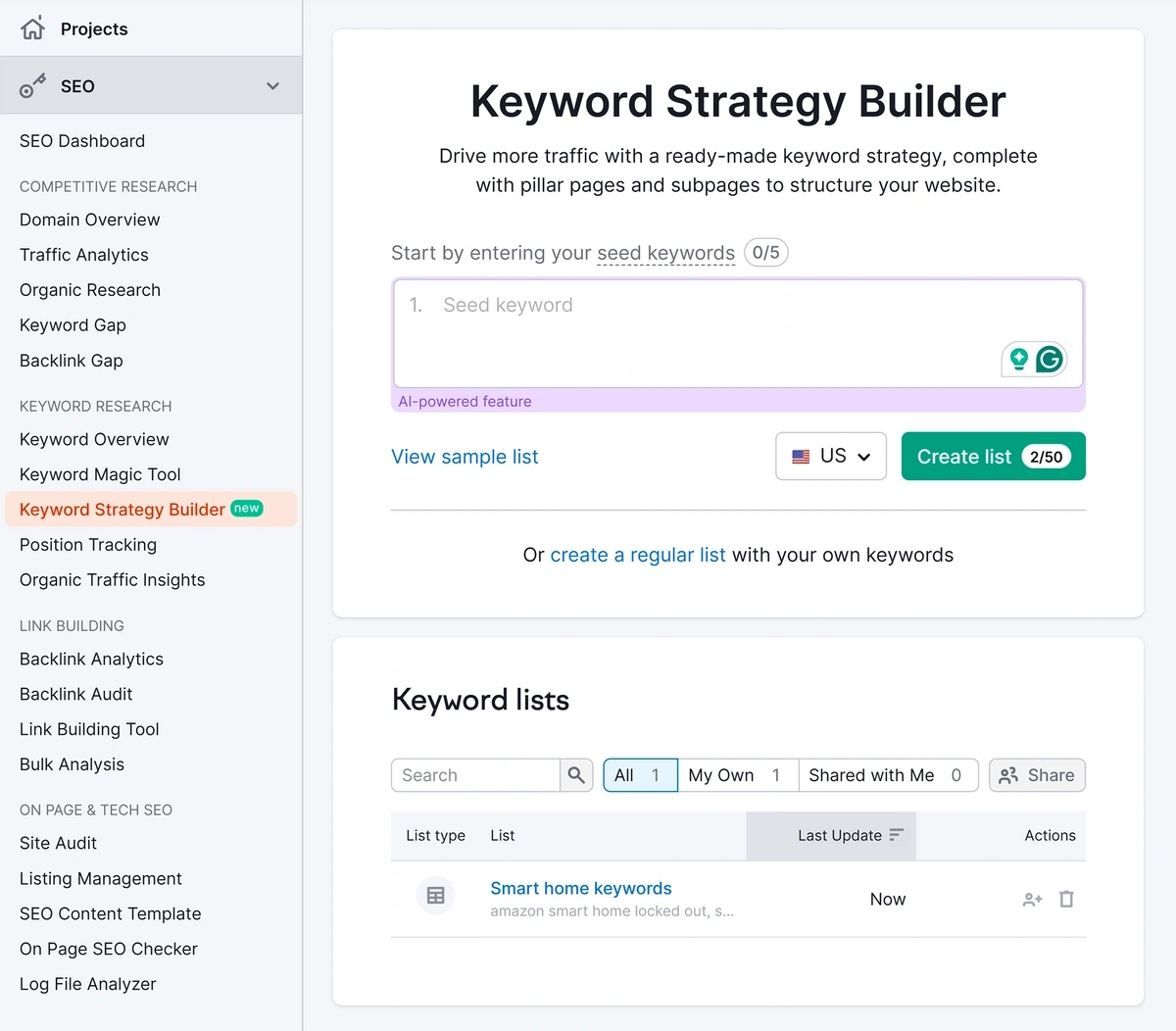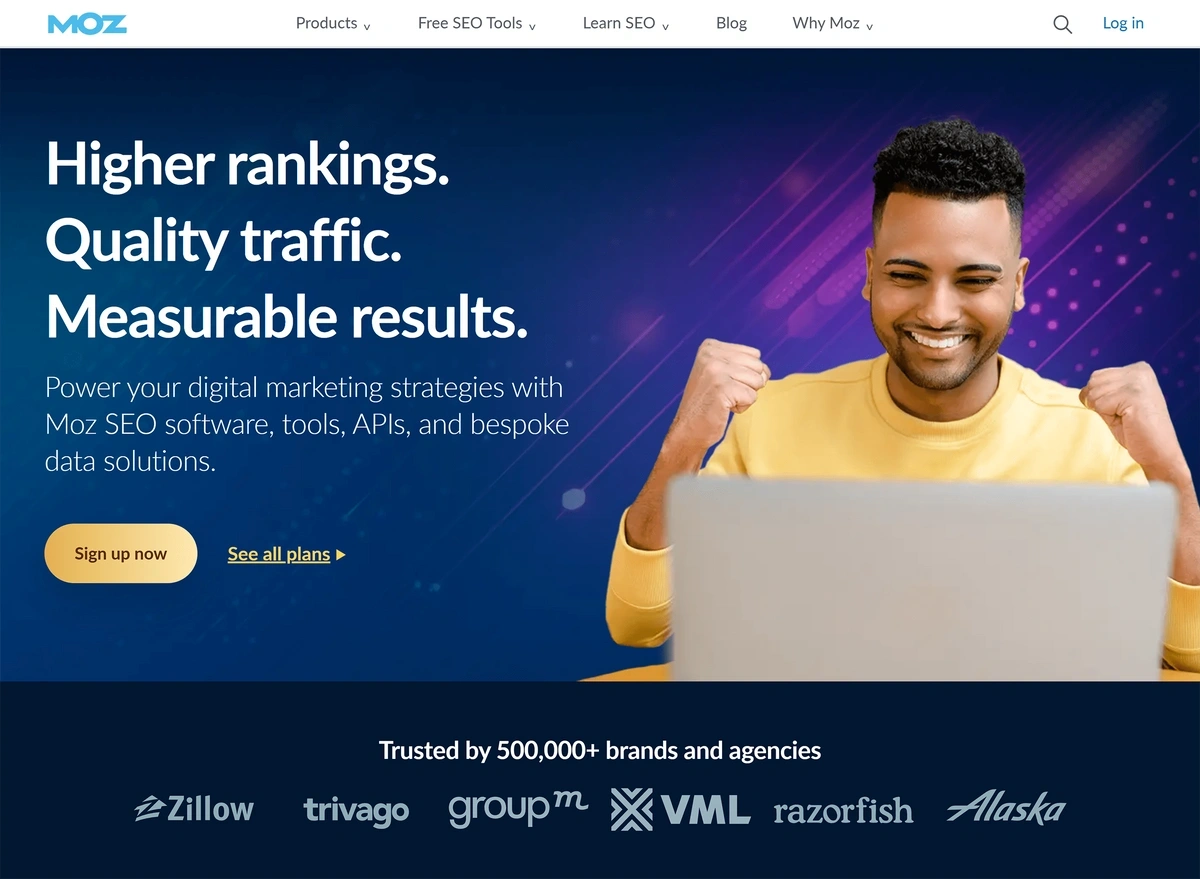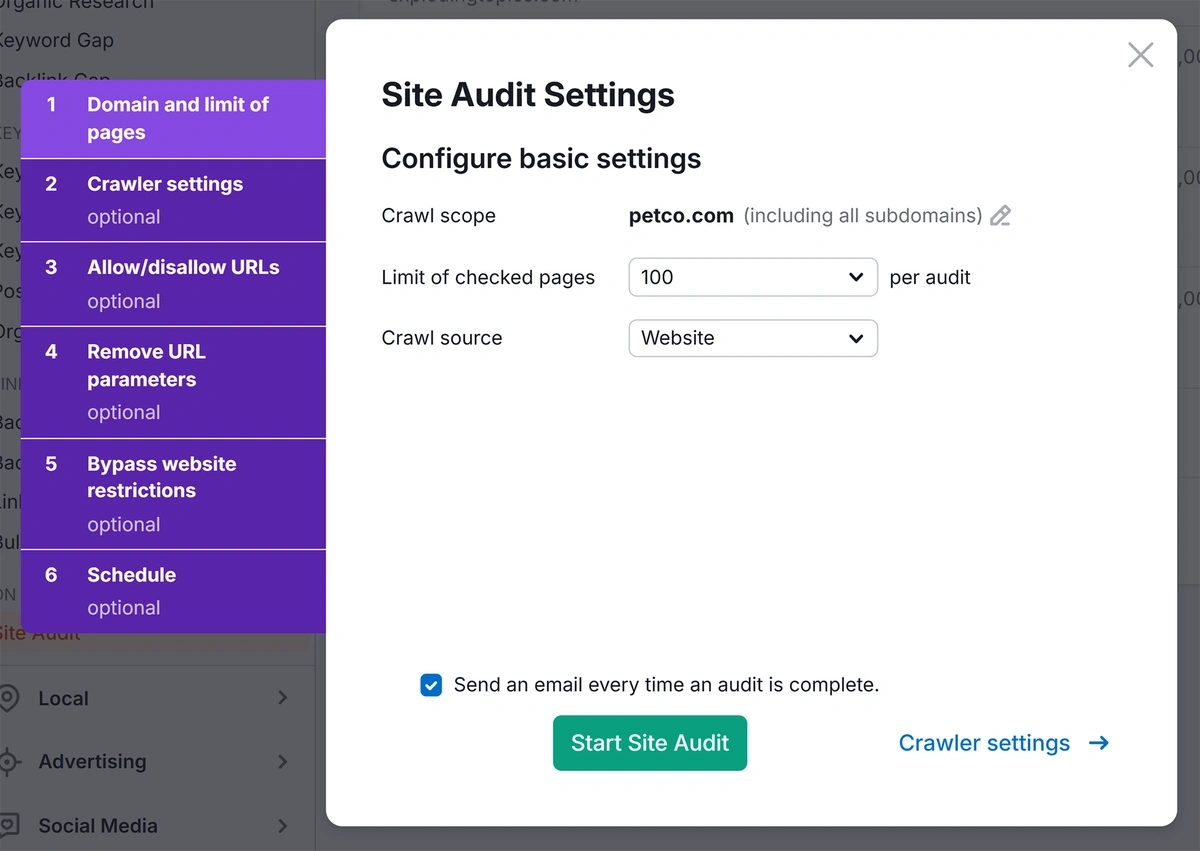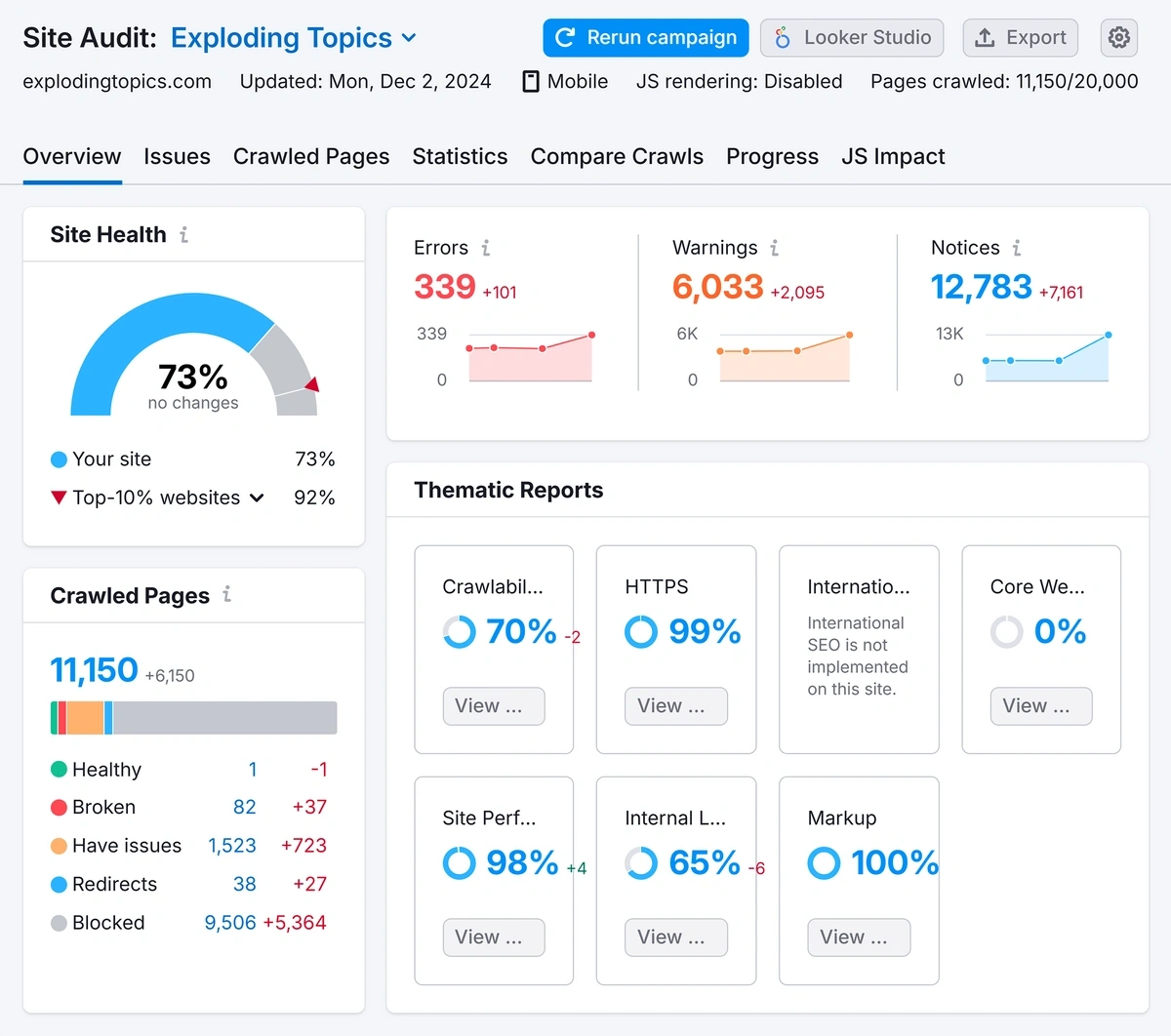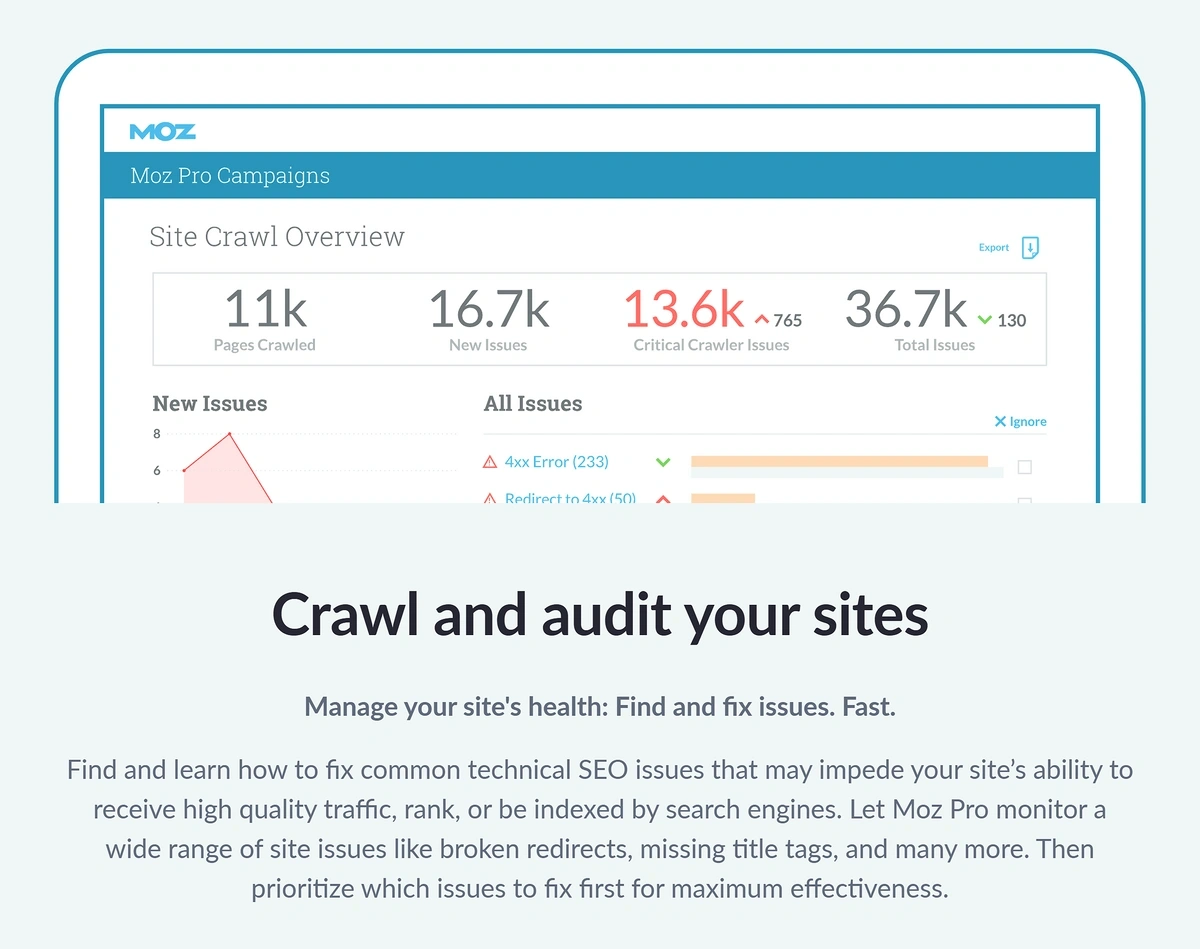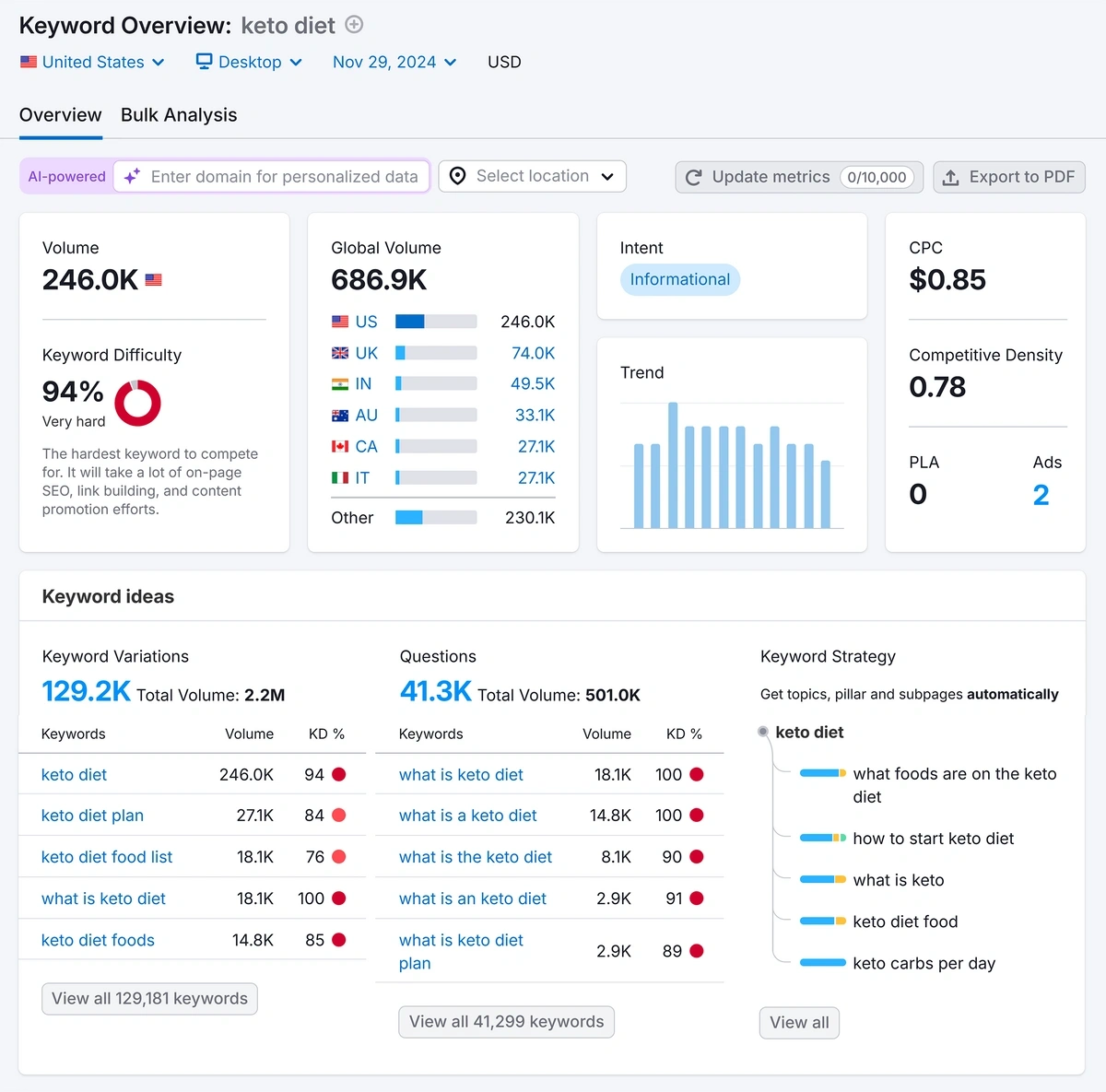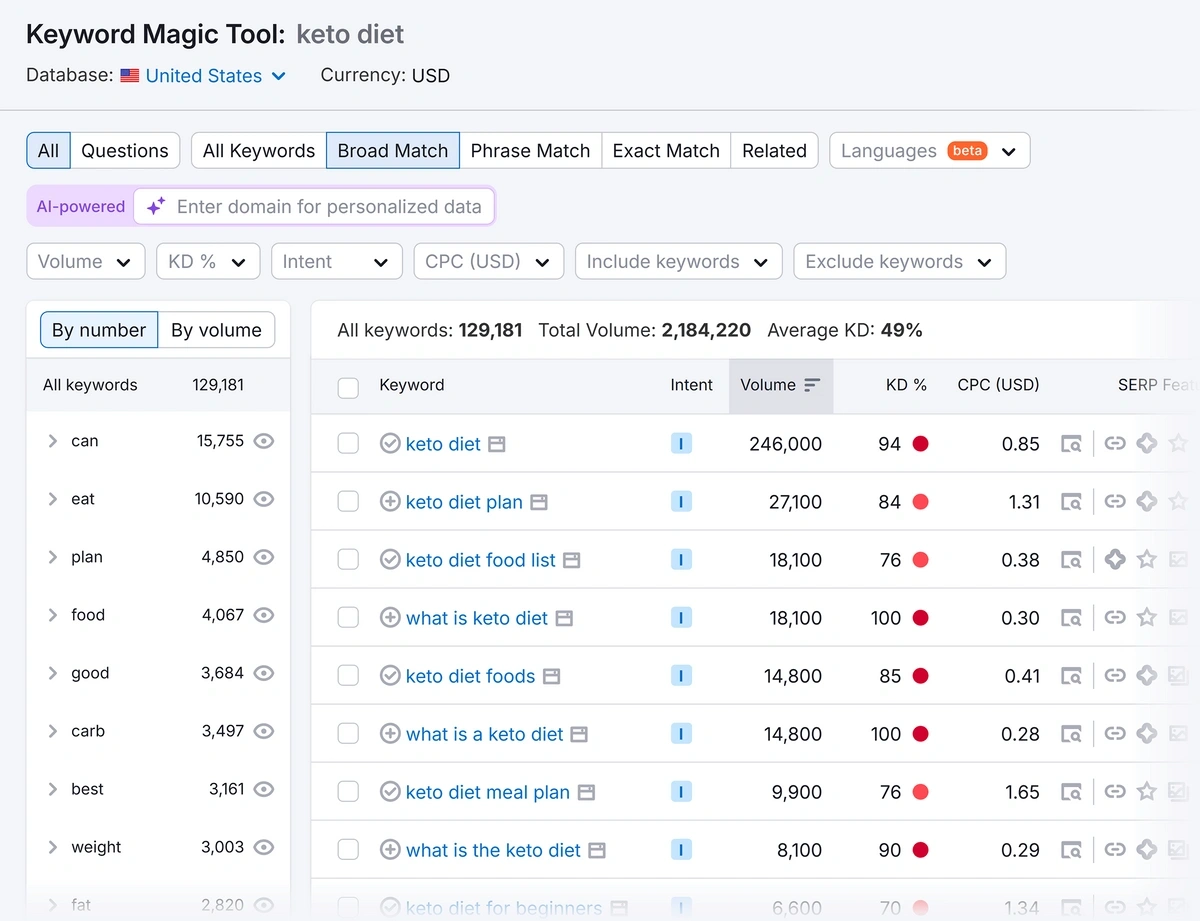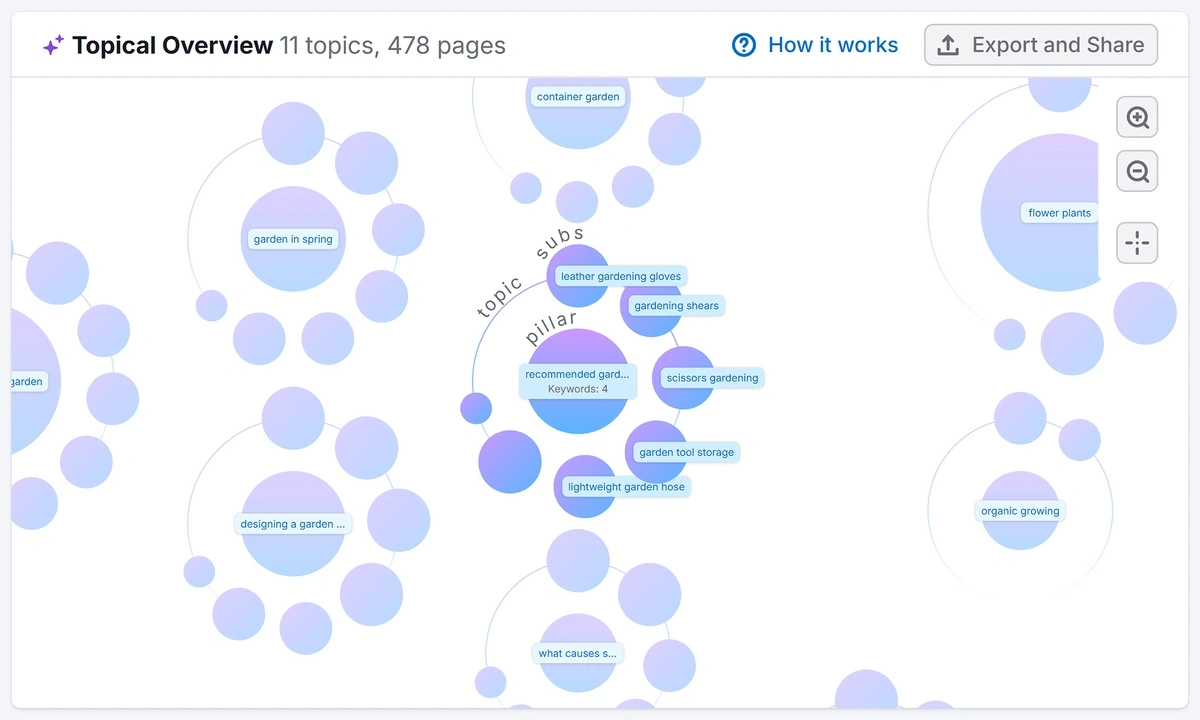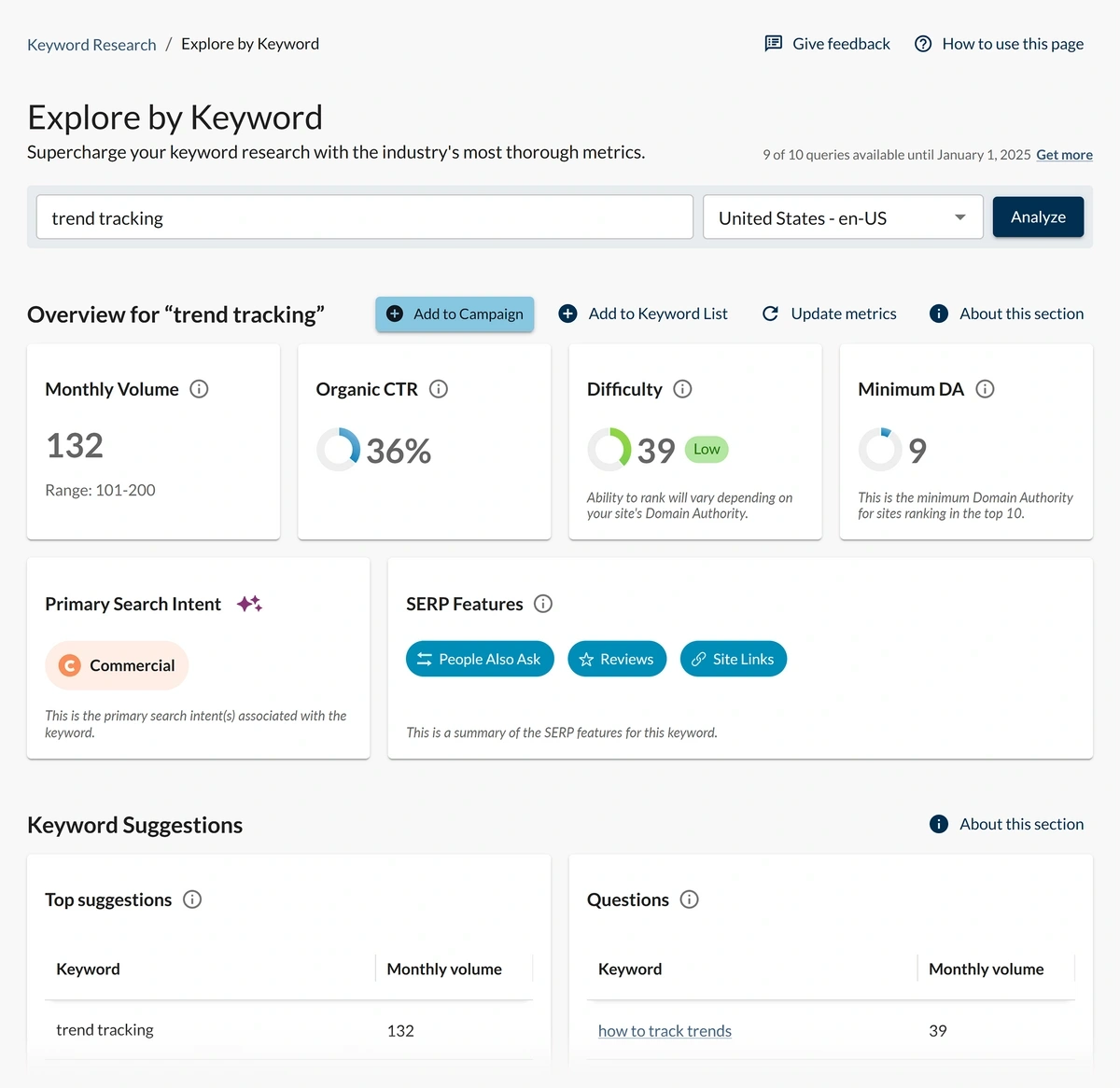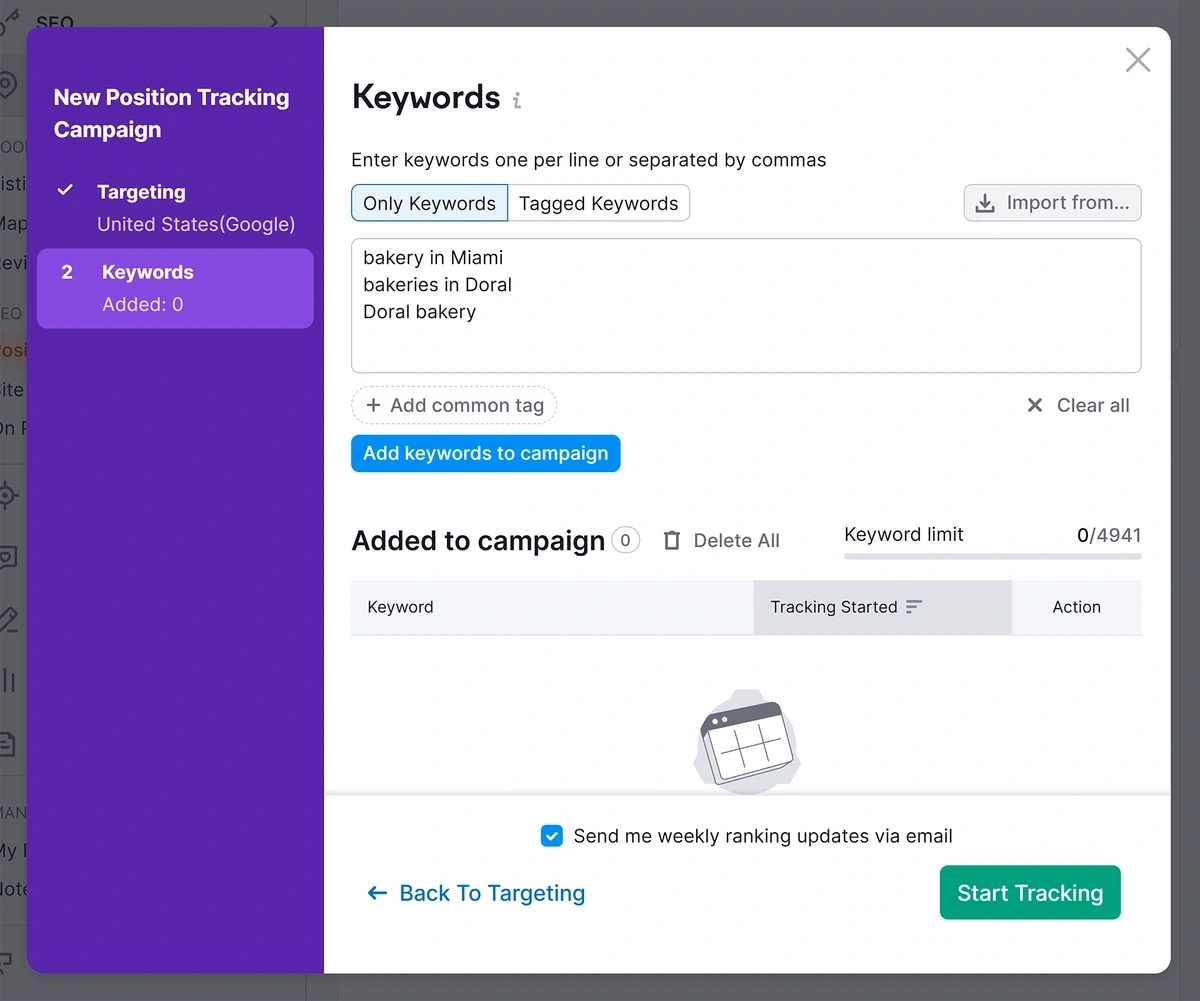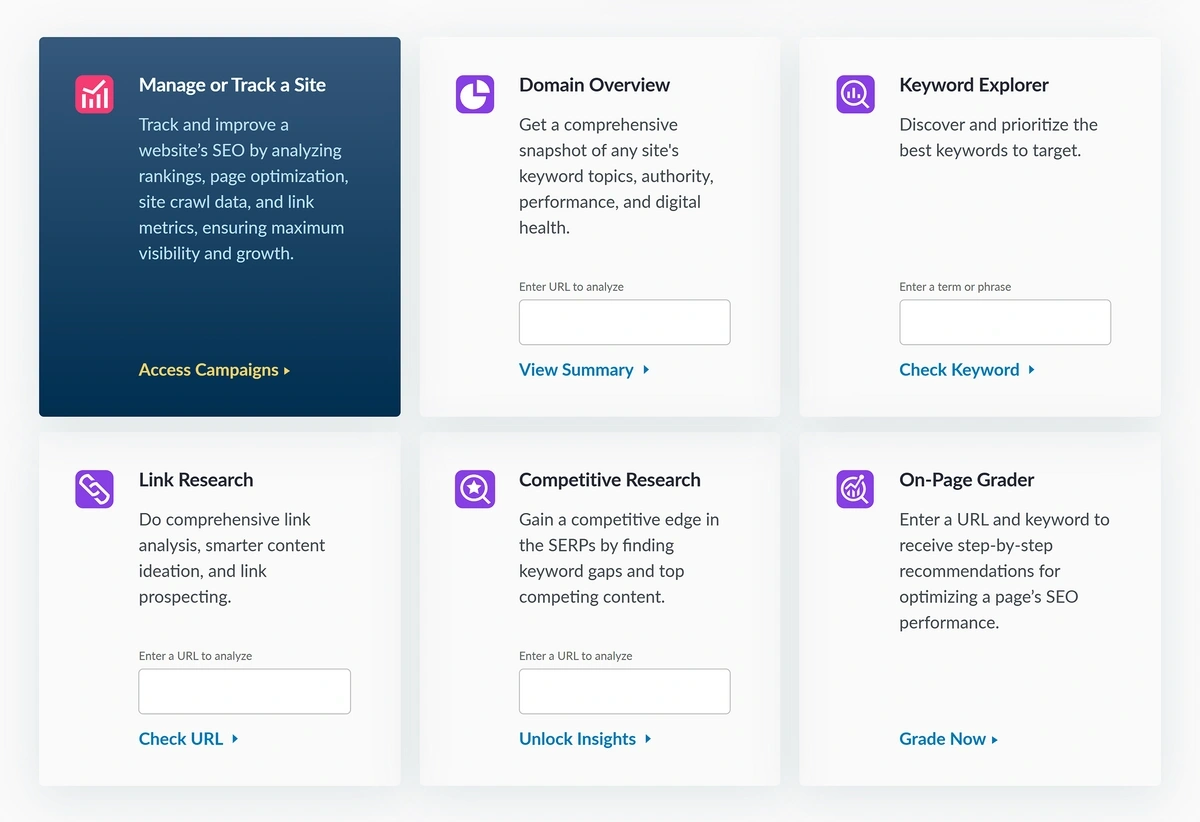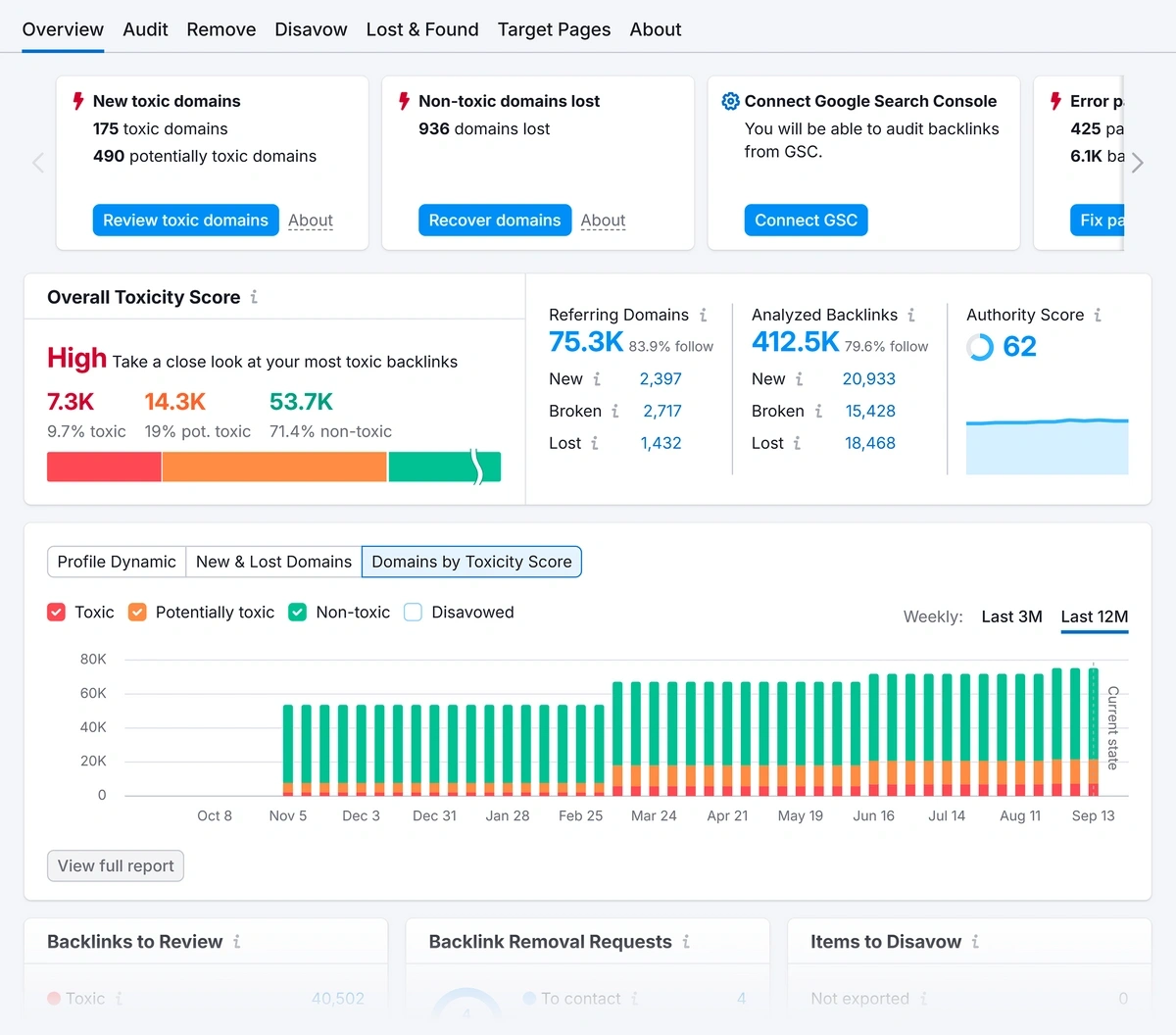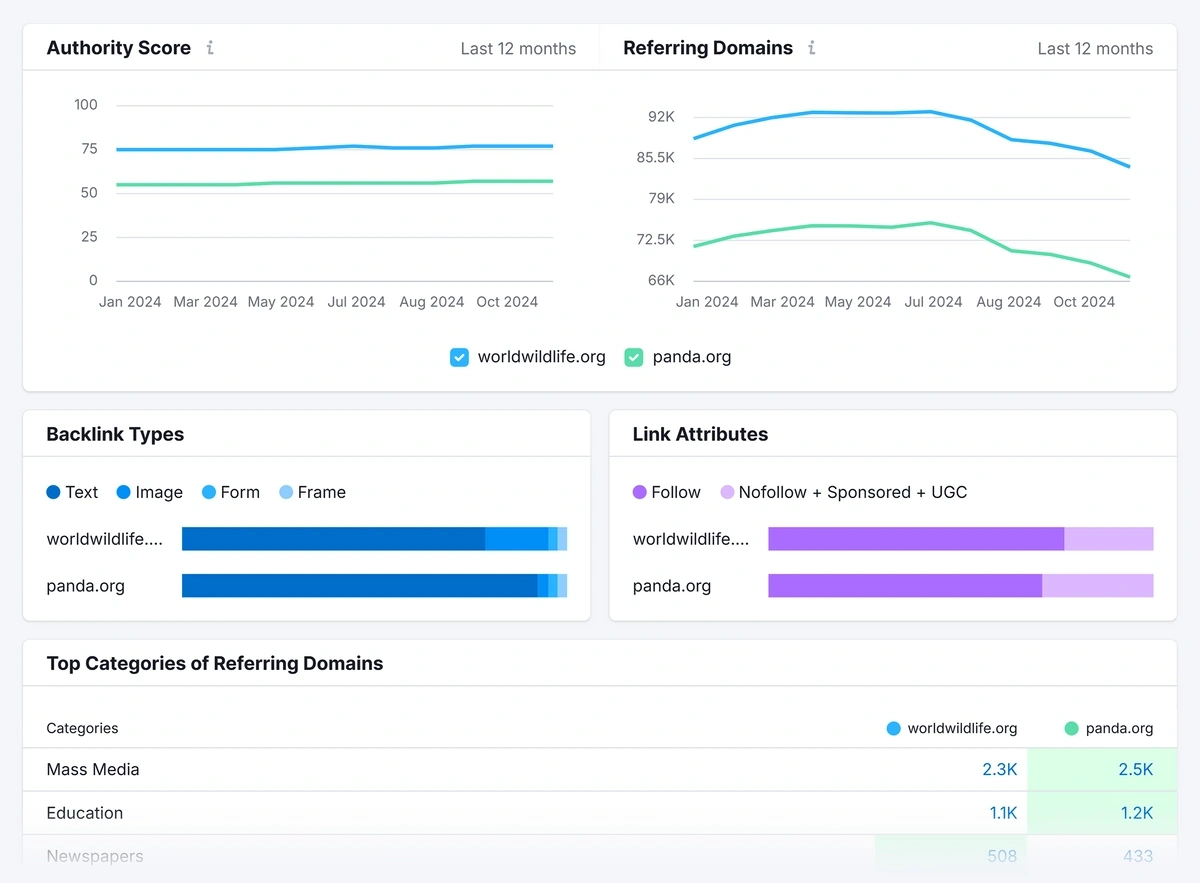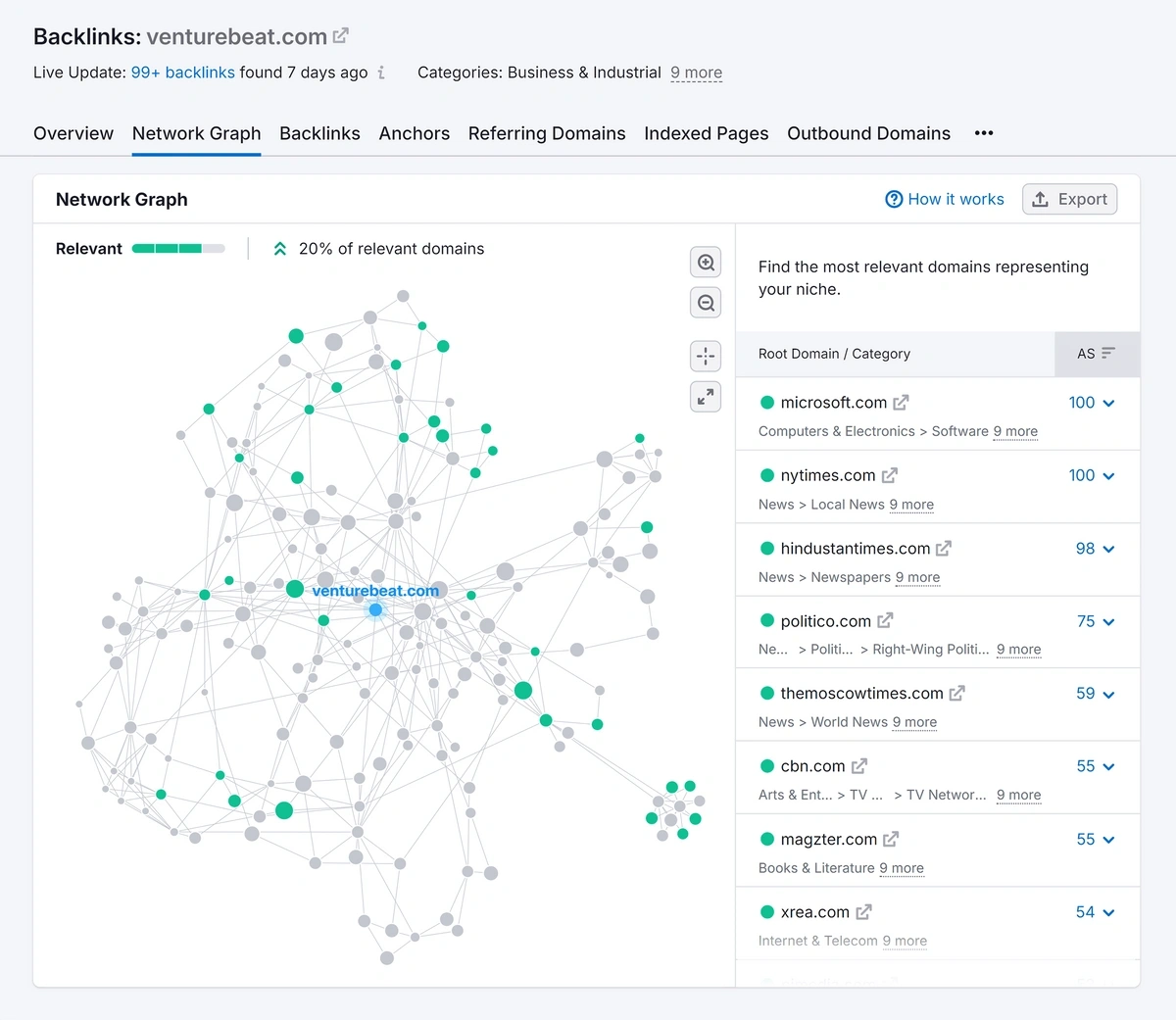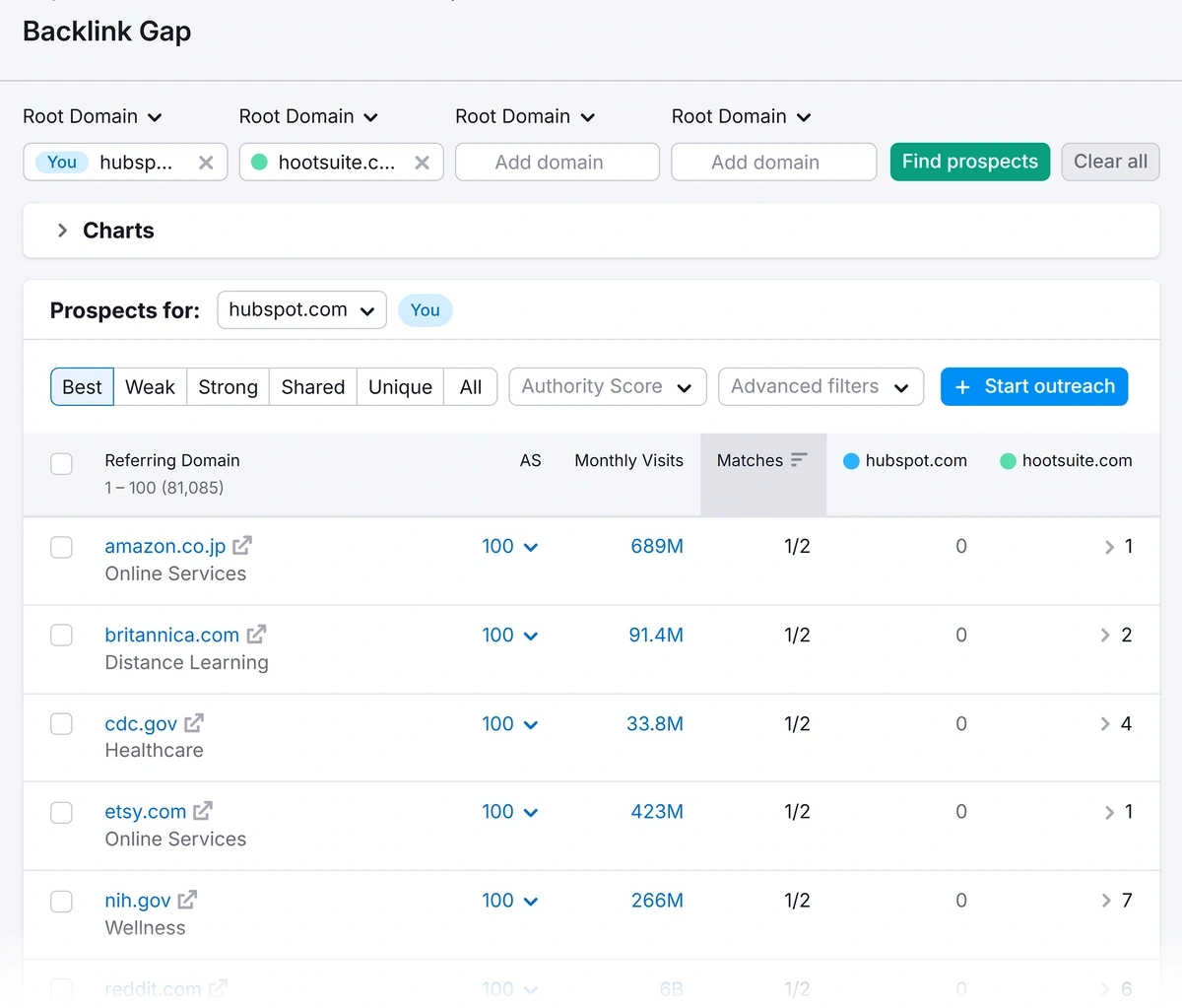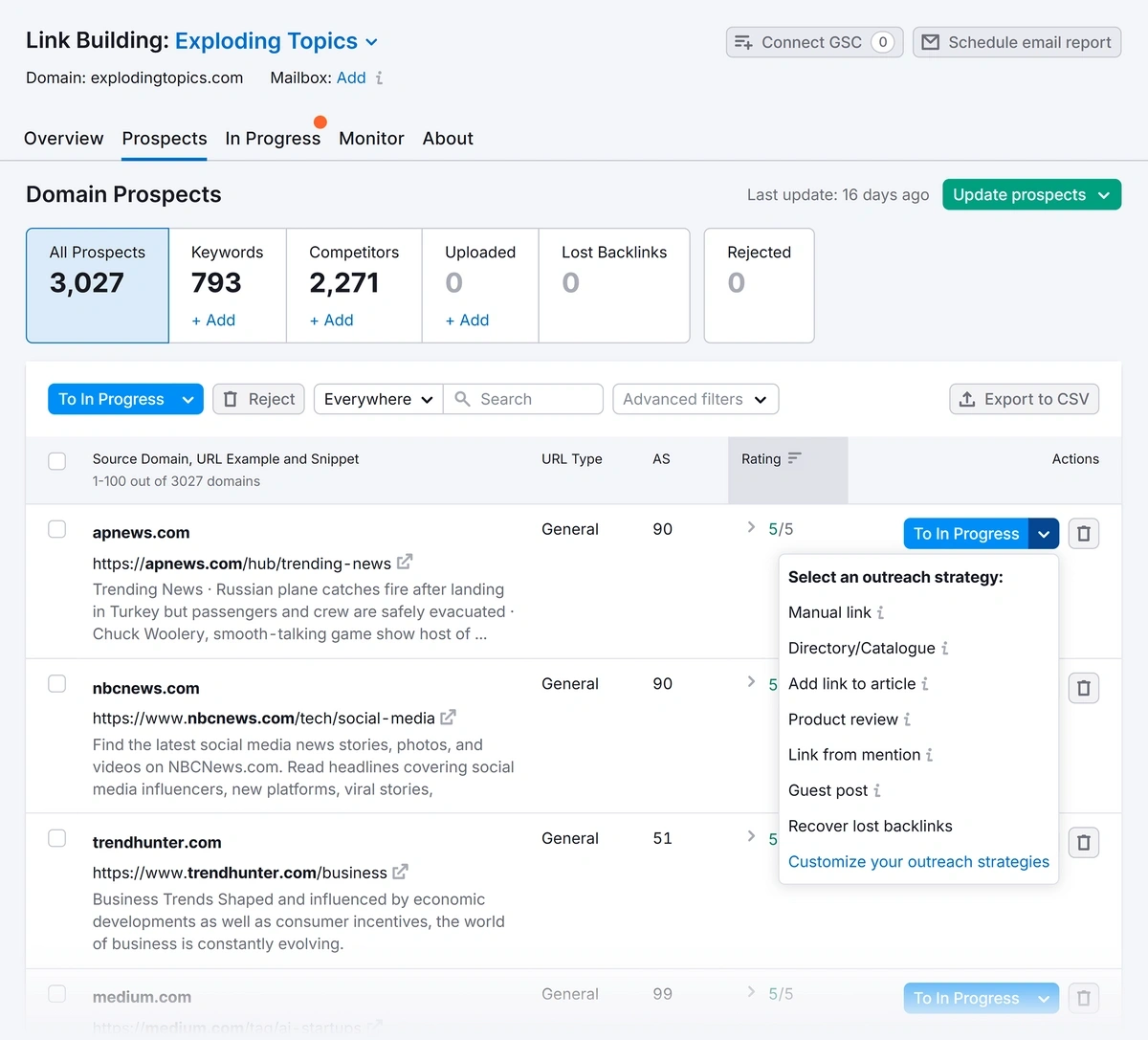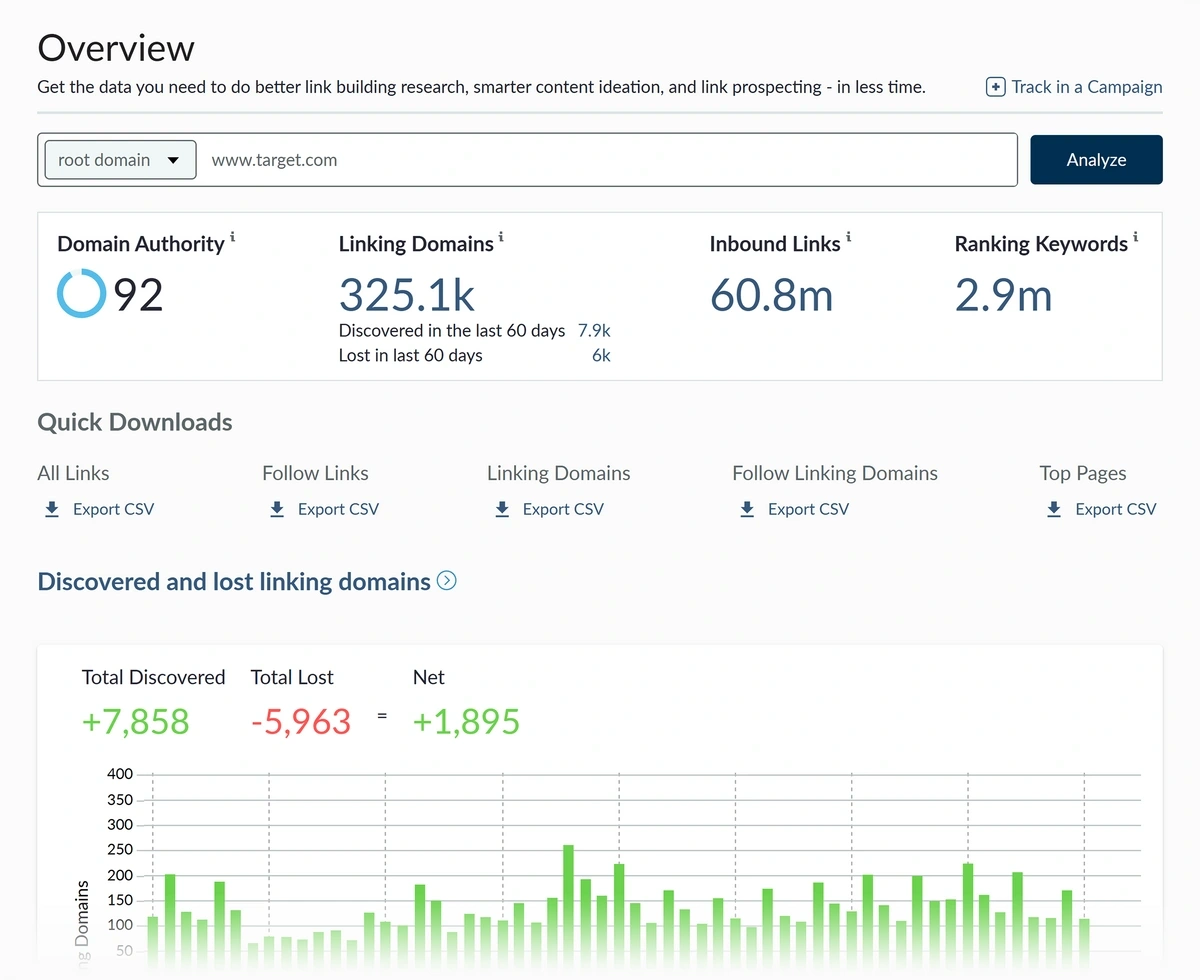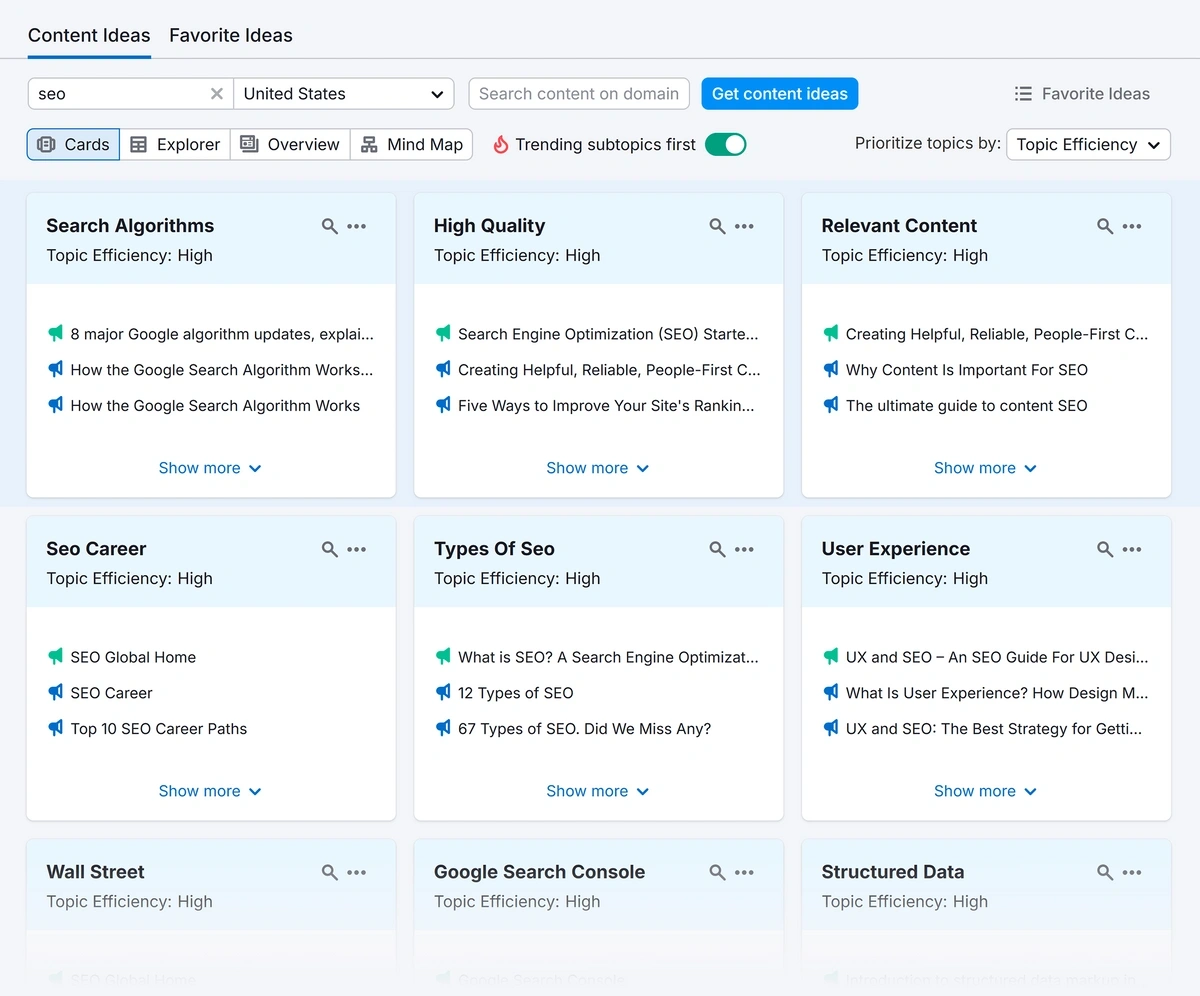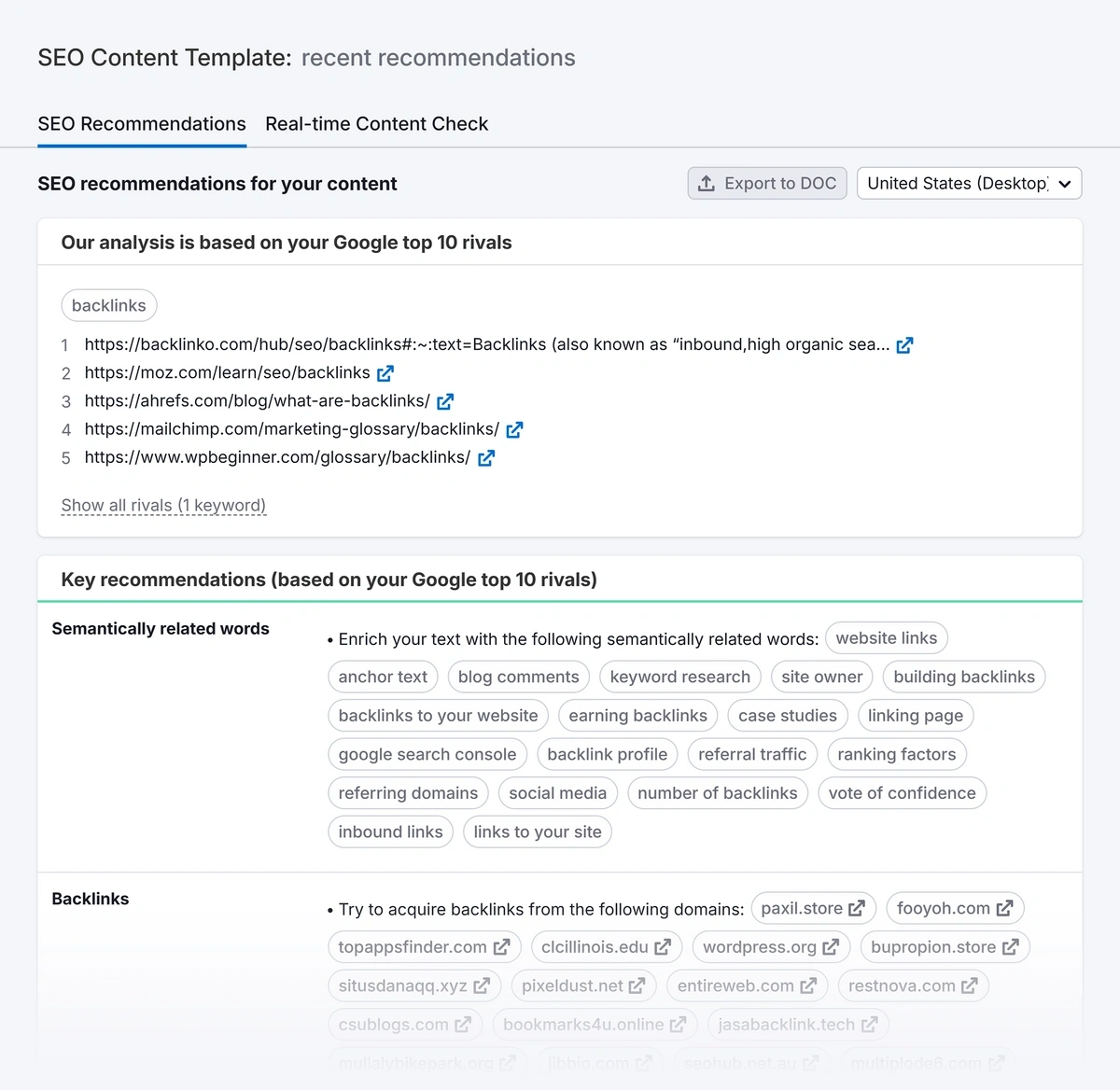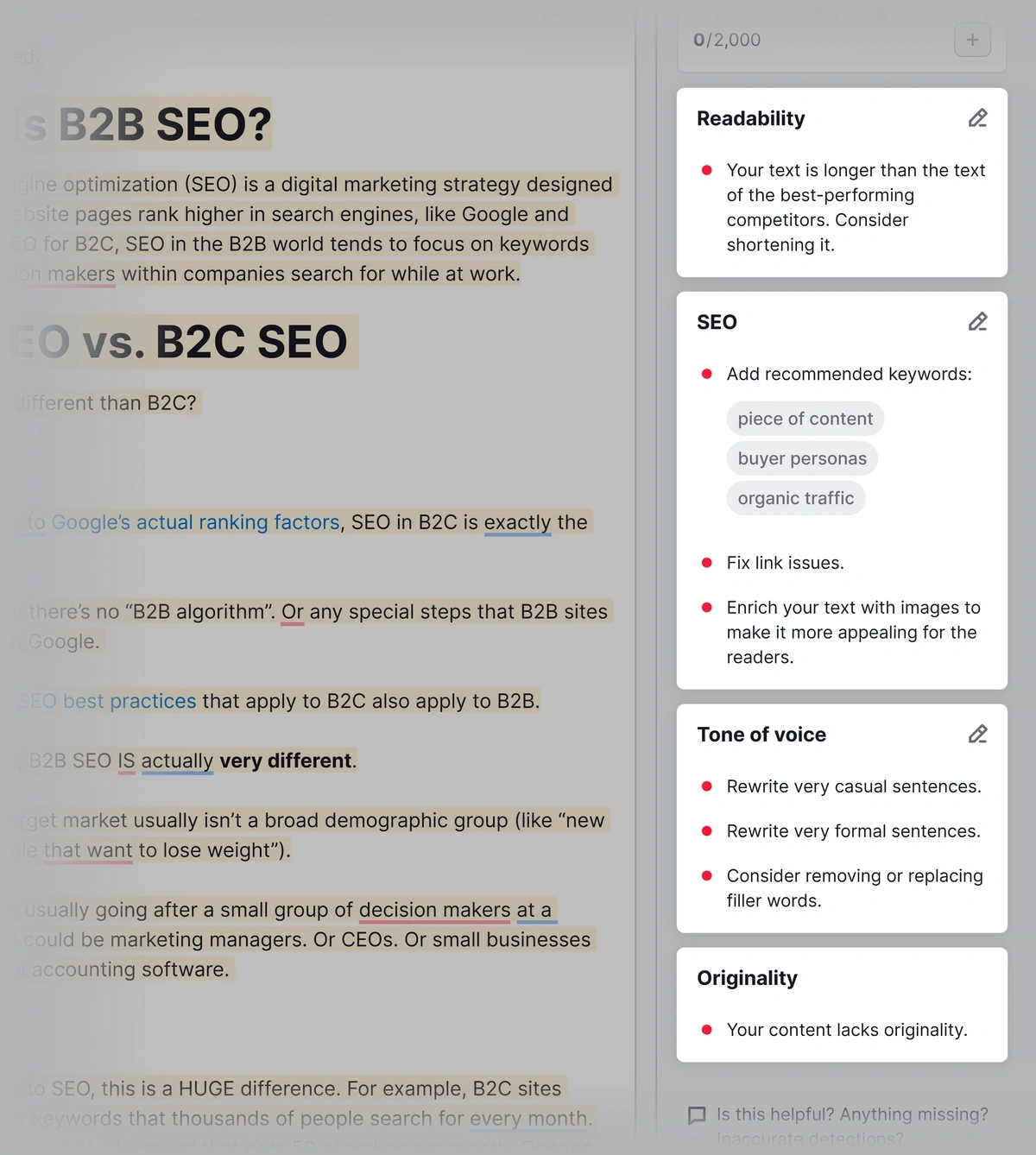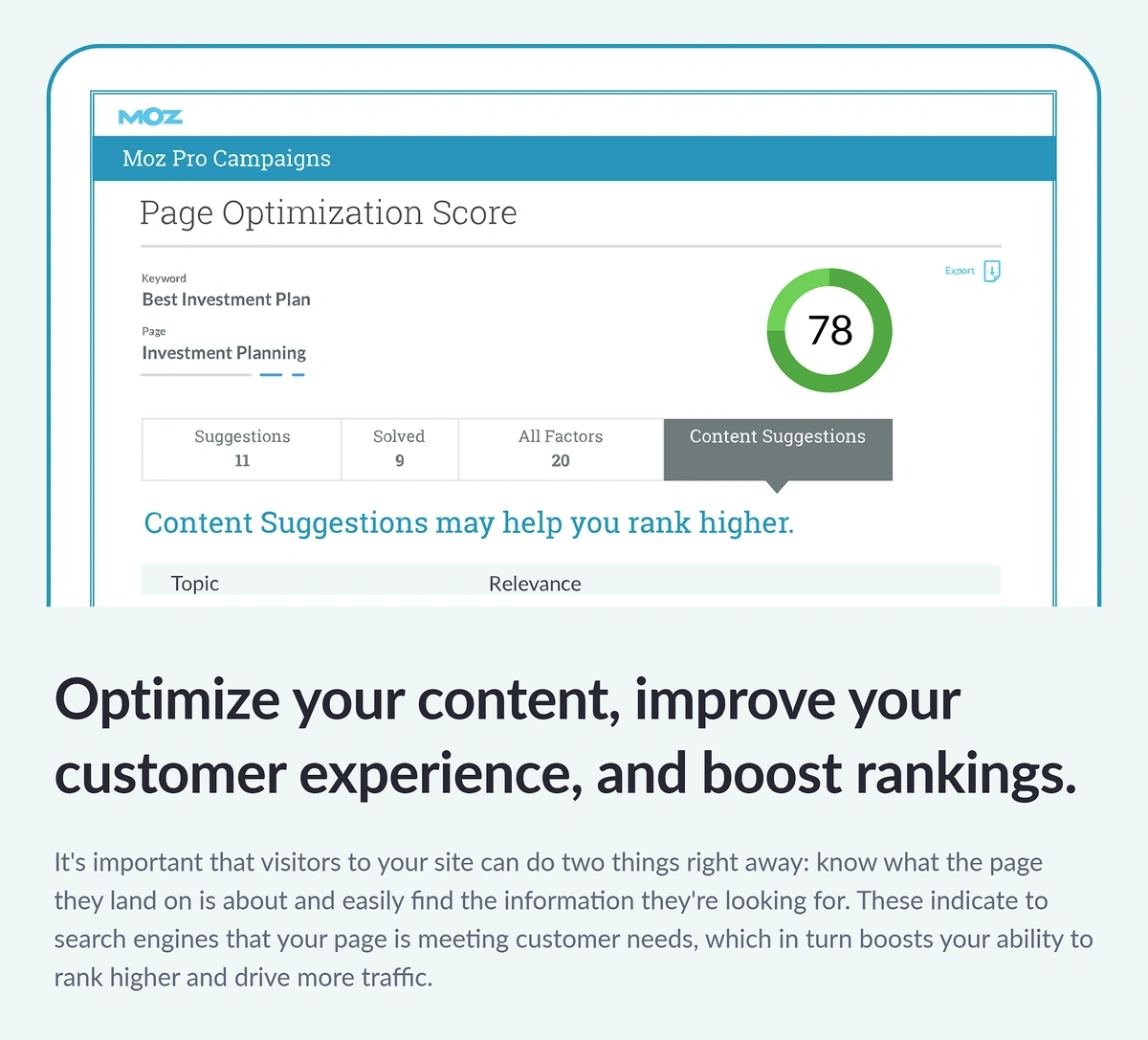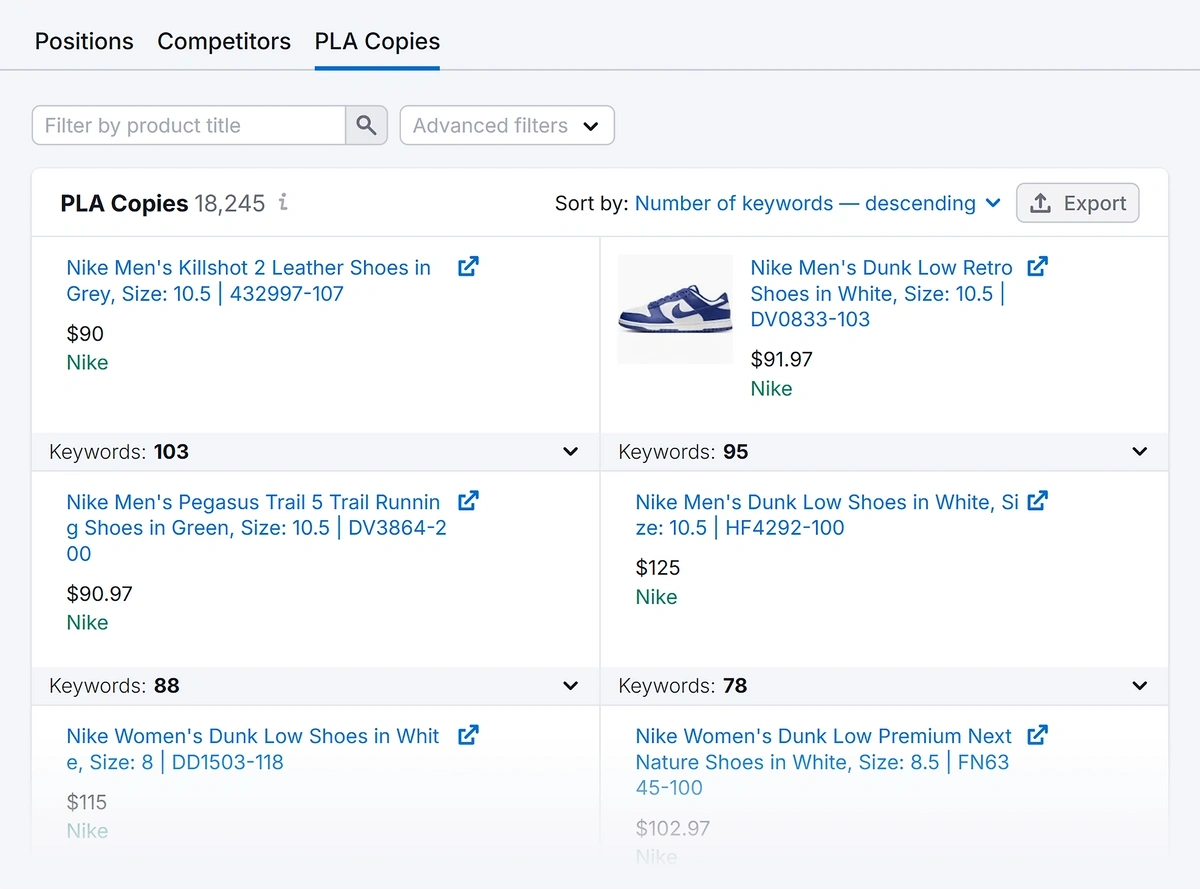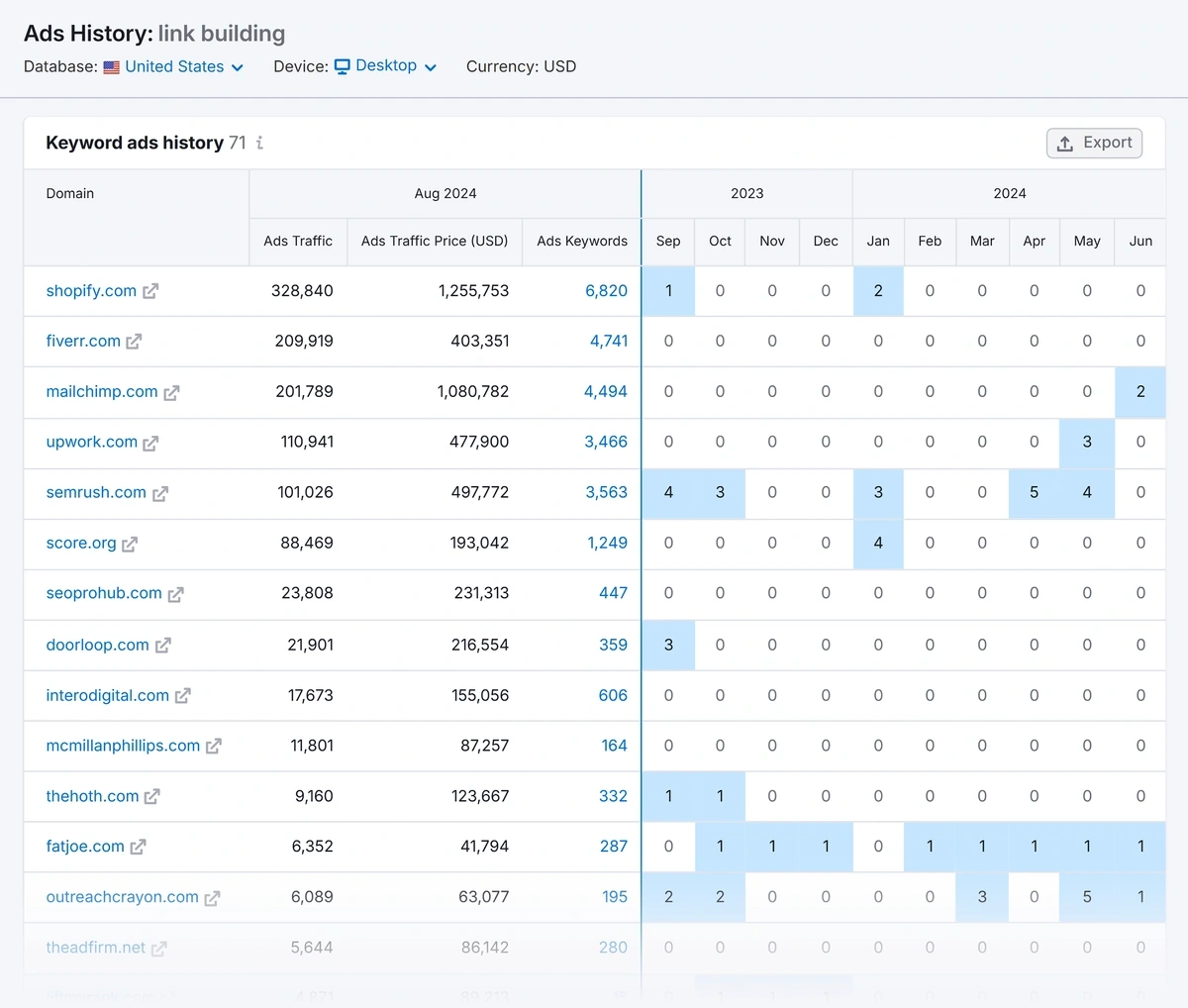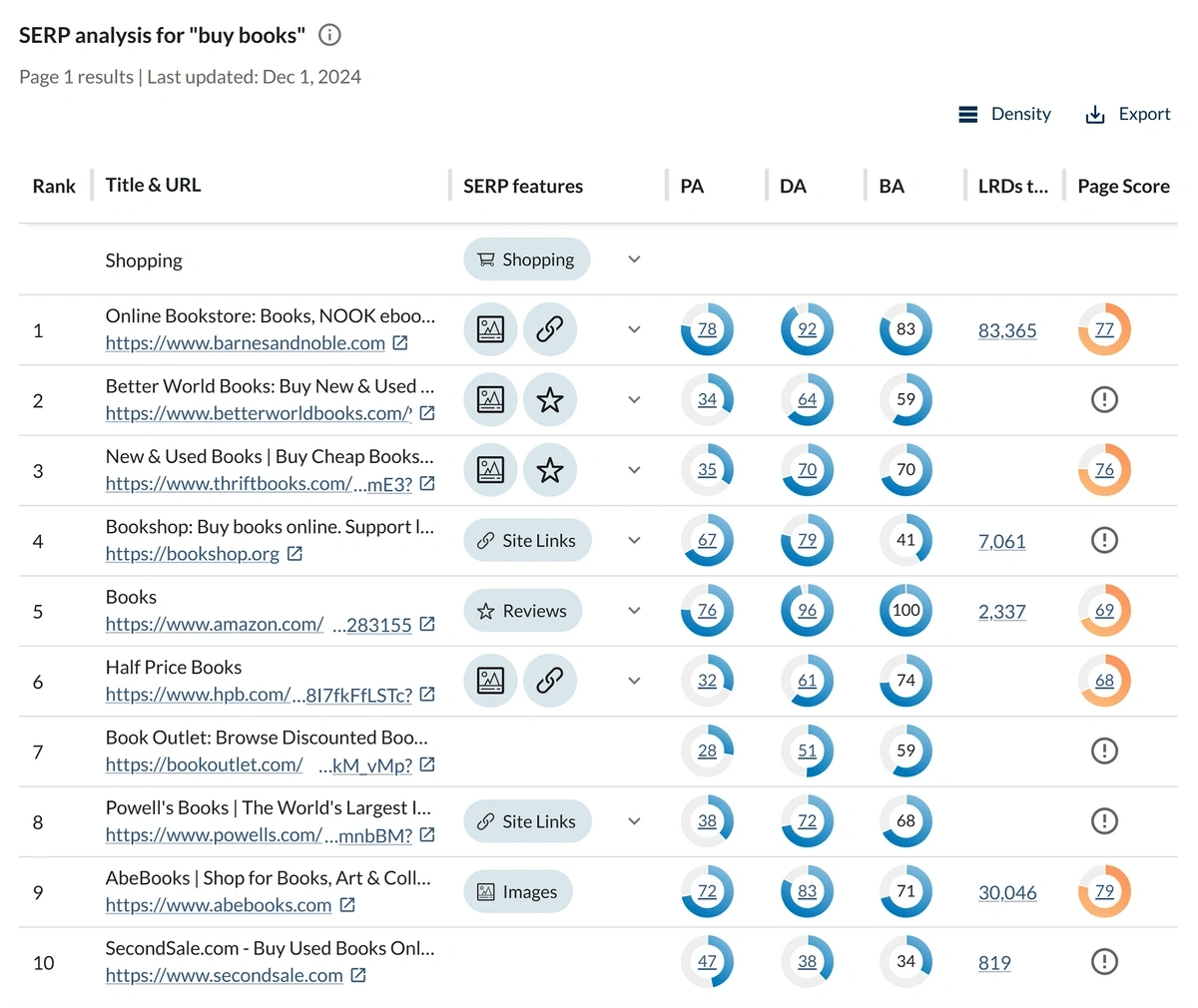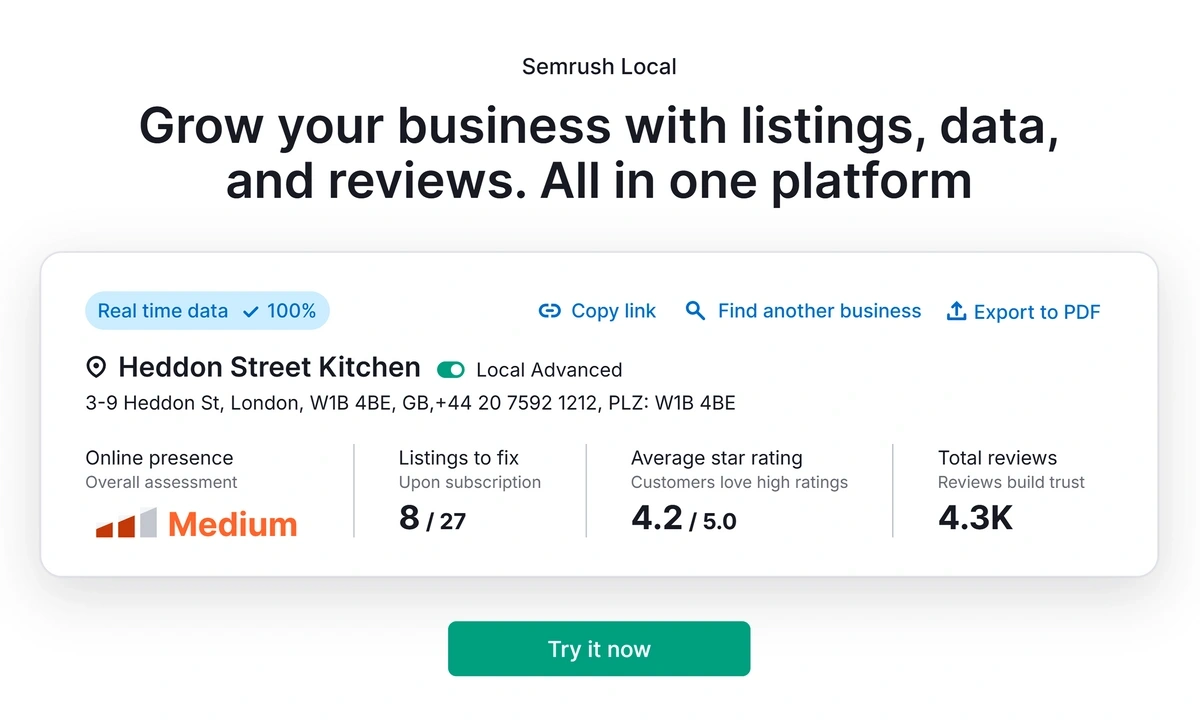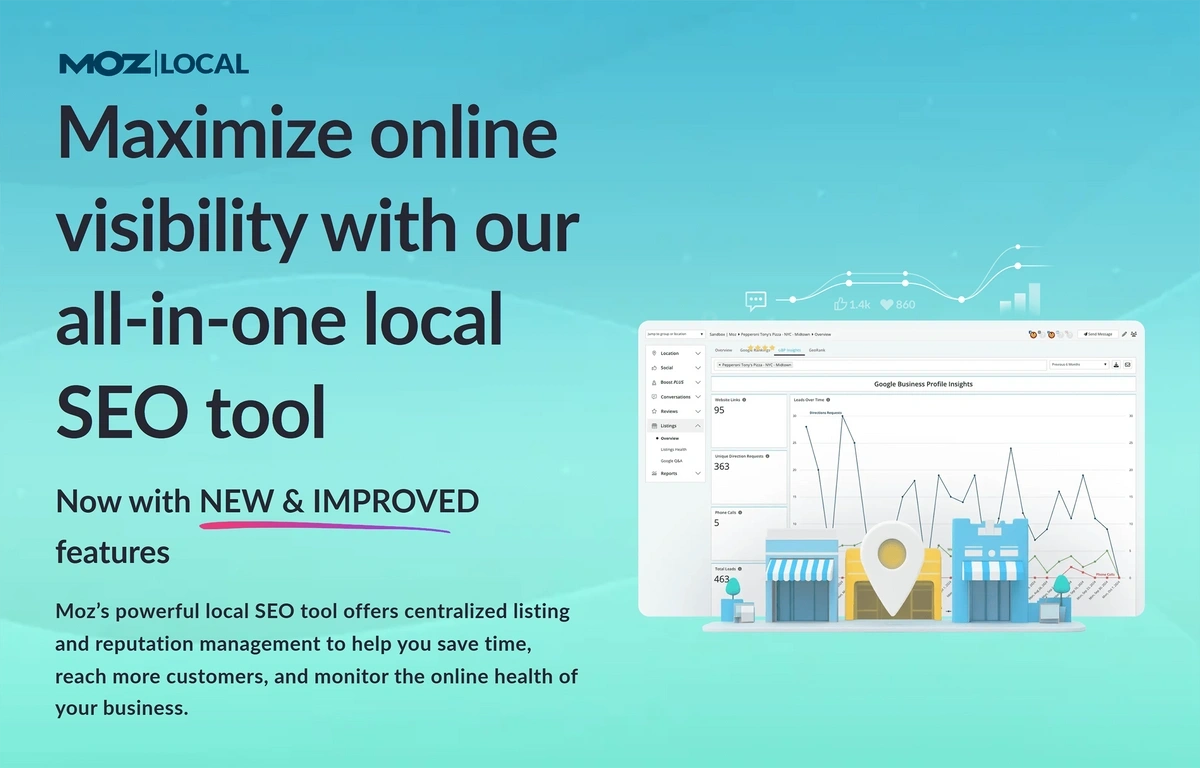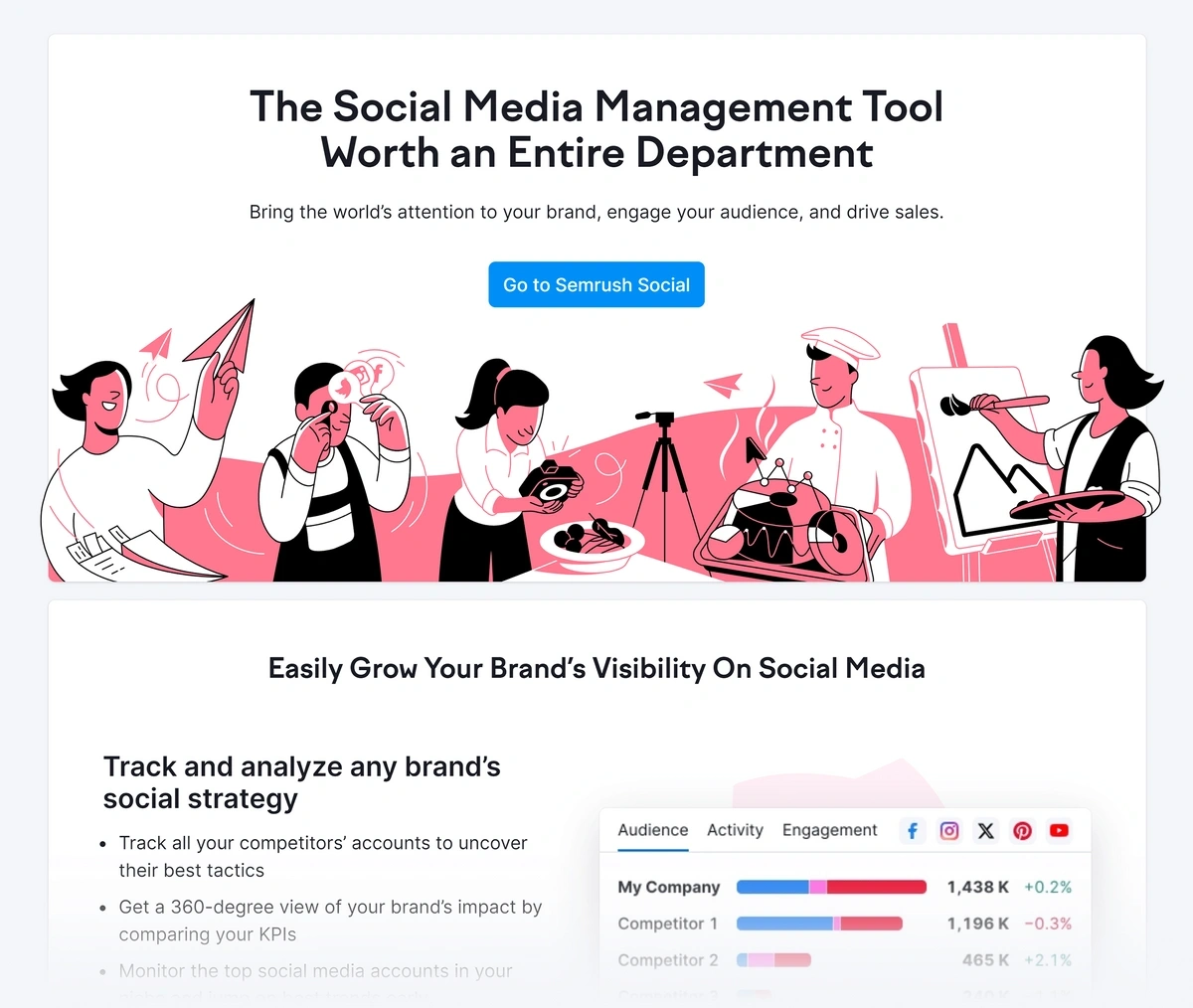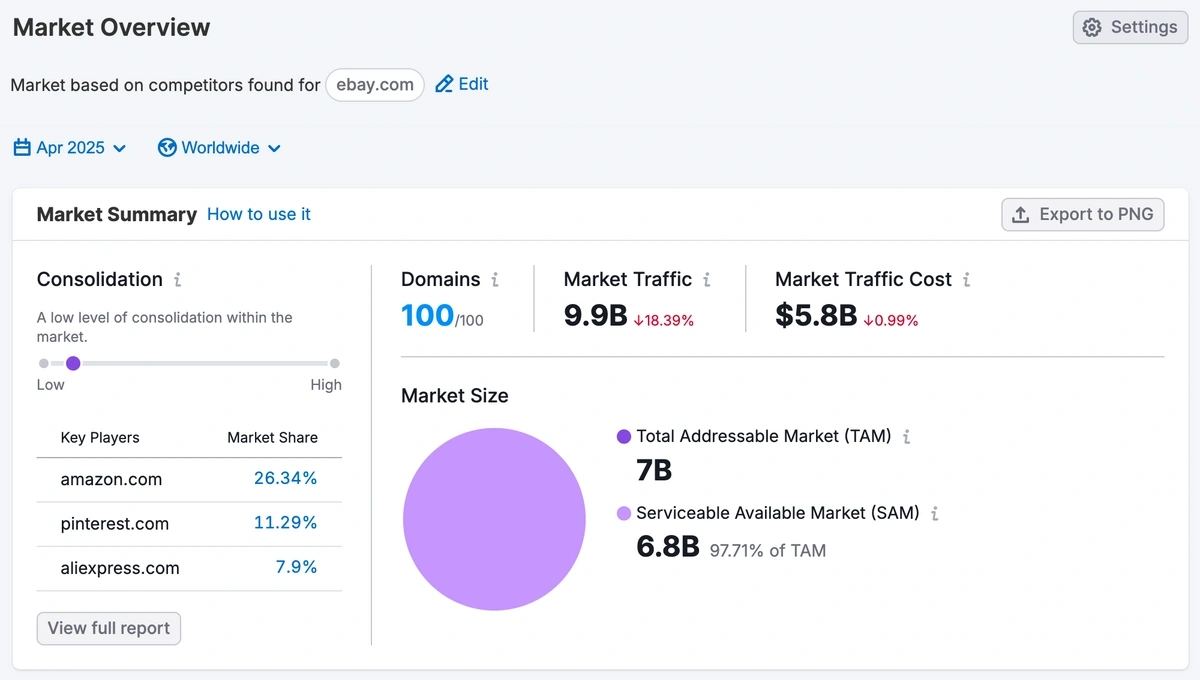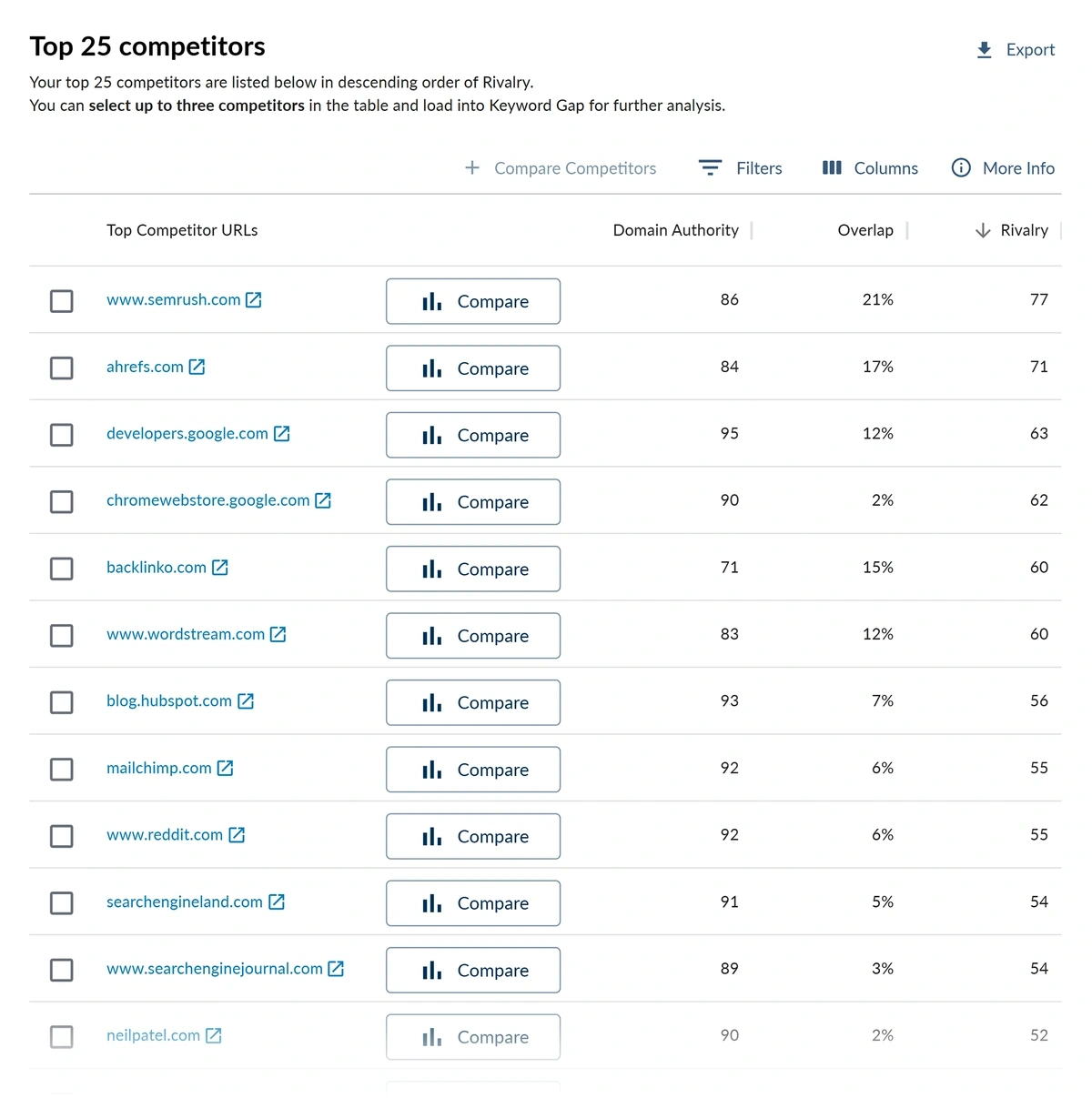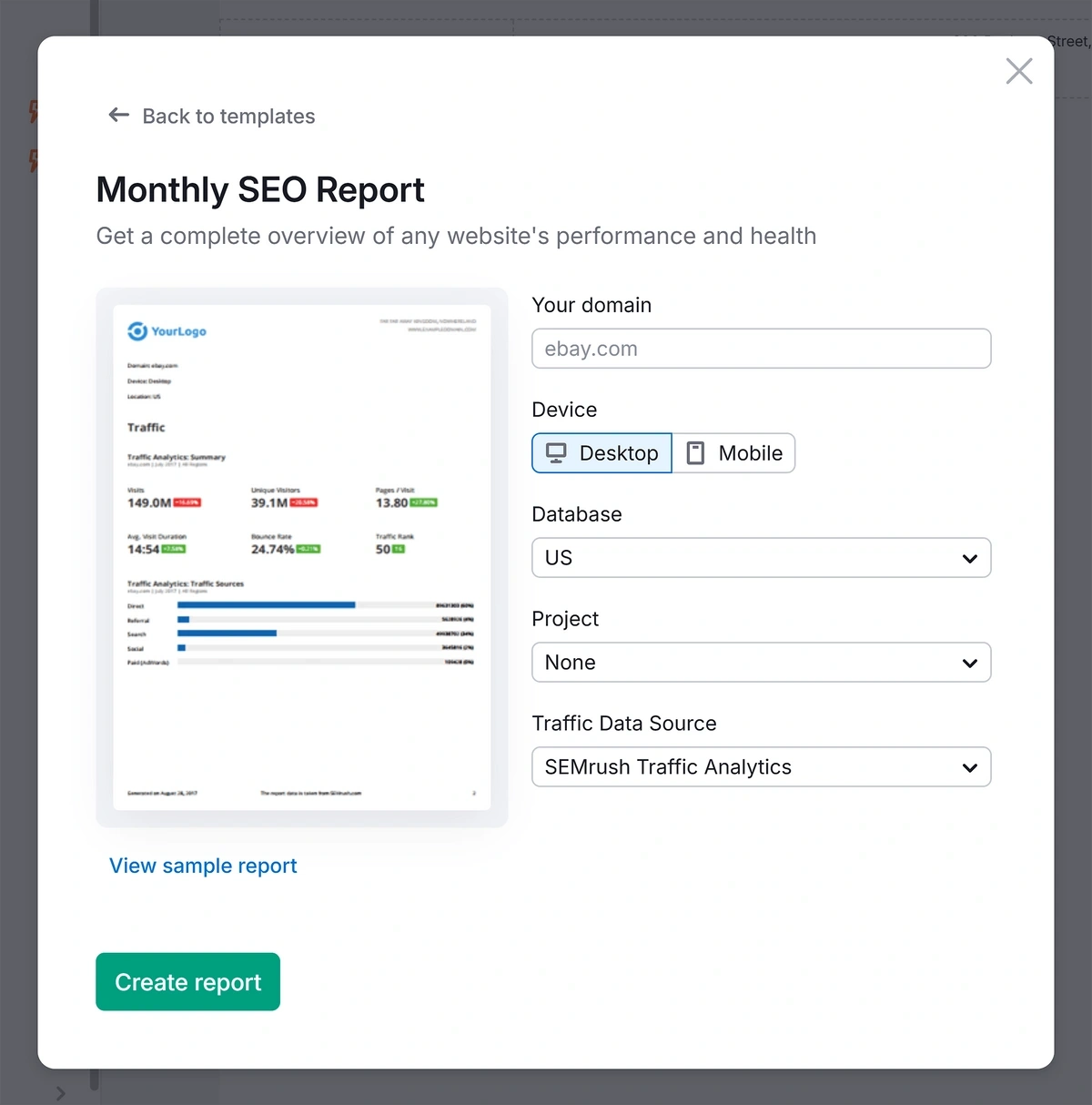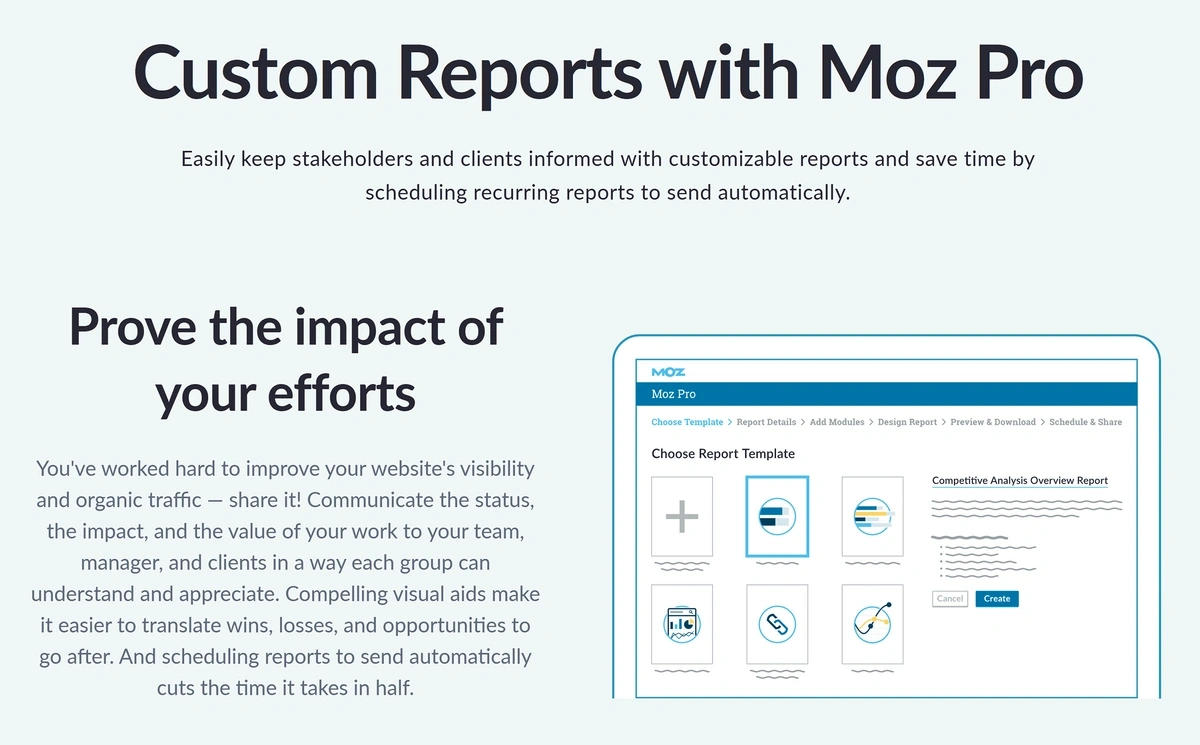Get Advanced Insights on Any Topic
Discover Trends 12+ Months Before Everyone Else
How We Find Trends Before They Take Off
Exploding Topics’ advanced algorithm monitors millions of unstructured data points to spot trends early on.

Keyword Research
Performance Tracking
Competitor Intelligence
Fix Your Site’s SEO Issues in 30 Seconds
Find technical issues blocking search visibility. Get prioritized, actionable fixes in seconds.
Powered by data from
Semrush vs. Moz: Which Tool Belongs in Your Marketing Stack?
Semrush and Moz are two search engine optimization (SEO) tools used by professional marketers and business owners.
While both platforms have some similar features, they’re very different once you peek under the hood.
The main difference between Semrush and Moz is variety and depth of features. Semrush tracks more keywords and backlinks. Moz covers essentials but its index is smaller. Semrush bundles PPC, social, and content tools (for extra cost). It feels like a full marketing suite. Moz stays SEO-centric but a capable tool in its own right.
Semrush Overview
Semrush is a comprehensive SEO tool that has over 1.1 million users.
I first encountered Semrush back in 2010 when I started working in SEO. They keep rolling out new features. There are over 55 different marketing tools in Semrush, and counting!
You don’t have to be a professional marketer like me to use Semrush, though: there are helpful tips that pop up and help you learn how to use each tool as you work.
Moz Overview
Moz is another SEO tool and resource hub.
Along with Semrush, Moz was one of the first SEO tools I ever used—its interface was user-friendly when I was a beginner, and it still is today.
However, its ease of use is partly down to the reduced number of tools.
Moz supports core SEO tasks like keyword research, site auditing, organic traffic analysis, and content optimization. Compared to Semrush, it doesn’t offer many tools to help you with your broader marketing efforts.
Key Differences and Features in SEO Reporting Tools: Moz vs. Semrush
To really figure out which SEO tool will be best for you, we have to dig deeper into each platform’s features.
I’ll share my experiences as a professional marketer and SEO consultant along the way. You may find it helpful to sign up for a free Semrush account so you can follow along as you read this guide.
SEO Audits
Working on your SEO is important, but if your site's health and usability is poor, it won’t matter how much great content you create or how high quality your backlinks are.
A site audit uncovers technical and structural issues that may hold your site back from getting more search traffic.
Semrush
The Semrush Site Audit tool is full of information that you can use to make effective technical SEO updates.
The process starts when you enter a domain into the Semrush Site Audit and configure how you want the crawl to operate.
You can exclude certain URLs, ignore robots.txt directives, and more.
After the crawl is complete, you’ll get a report that includes information about:
- Technical issues and content errors that can impact SEO performance
- Web crawler accessibility
- Core Web Vitals
- Internal link health
And by setting the paramaters wide enough, you can end up with a list of URLs to every page on your site, which is invaluable when performing a full content audit.
Moz
Moz includes an on-demand site crawl tool that returns a breakdown of critical page errors and content issues.
You can also see more information about your link health by running a second Moz report called Domain Overview.
Keyword Research
Once I’m confident that the site I’m working on is technically sound, I advance to keyword research.
Semrush
Semrush has three different tools that I use to find related keywords and turn them into an SEO content strategy.
I start by typing my main keyword idea or topic into the Keyword Overview tool. This connects me to the extensive Semrush keyword database and shows me information like:
- Organic search traffic estimates
- How difficult it may be for me to achieve a good search ranking for this keyword
- What the typical search intent is for this term
- How much it might cost to run a PPC ad on this keyword
I can also put in my domain name and see more personalized information about how hard it will be for me to rank for this term or related queries.
That’s a unique feature that some SEO tools miss. It makes optimizing your site content a lot easier.
From Keyword Overview, I’ll head over to the Keyword Magic tool and check out other keyword suggestions.
Finally, once I’ve picked out a few target keywords, I’ll send them to the Keyword Strategy Builder.
This tool groups keywords using the pillar page method. All I have to do now is pick a topic cluster and begin creating content.
I can tell you from experience that doing this kind of topic organization manually may take hours. Semrush delivers results in under 15 minutes.
Get More Search Traffic
Use trending keywords to create content your audience craves.
Moz
You can also conduct keyword research using Moz.
Like Semrush, Moz’s keyword reports include a high-level overview of search volume, keyword difficulty, search intent, and related terms.
While Moz doesn’t personalize these results with your target domain, it does give you an estimate of the Domain Authority required to rank for a term.
Rank Tracking
It’s important that, after identifying the keywords you want to target, you save them to a tracking list. This allows you to monitor your progress in the search engine results pages (SERPs) over time.
Semrush
It’s easy to do this in Semrush—just open up the Position Tracking tool and start a new project. Once you add your domain, location, and keywords to track, you’ll get automatic email updates that alert you to any changes.
One of the best features for me is that Semrush tracks rankings for Google, Bing, and Baidu. When you consider that Baidu receives 781 million monthly visits as of May 2025, it's clear that it makes sense to pay attention to search engines beyond just Google.
And Semrush also tracks ChatGPT.
Modern SEO is about maximizing your visibility across as many search surfaces as possible, including LLMs. Take advantage of this feature to monitor how well you're ranking on AI tools like ChatGPT.
With Moz, your tracking is limited to traditional search engines like Google and Bing only.
Moz
Rank tracking is simple in Moz, too. You’ll need to set up a campaign, enter your domain and keywords, and wait for the report to populate.
While Moz's STAT is a great tool for conventional rank trackings, Semrush is a clear favorite for me because it can measure ranking changes in ChatGPT, which is where Moz is lacking at the moment.
Backlink Analysis
If you’ve spent any time researching off page SEO, you’ve probably heard that it’s a good idea to get other sites to link back to yours. This is true, but only if the links are high quality and relevant.
A backlink analysis tool will help you figure this out.
Semrush
The Semrush Backlink Audit tool is a simple way to assess if your site is getting valuable or toxic, spammy backlinks.
Plug in your domain and some information about your business, and you’ll have a report in minutes.
There’s also a Backlink Analytics tool that can show you how your backlink data compares to a competitor. It can help you to understand:
- How many links you and your competitors have
- The quality of those links
- What your website authority looks like in terms of an overall score.
I really like the “Network Graph” that’s part of Semrush Backlink Analytics.
This includes a visualization of all the backlinks that any site has.
You can filter the results by type of link, too.
If you’re serious about building a high-quality backlink profile, there are two more tools you'll want to use: the Semrush Backlink Gap analysis and the Link Building Tool.
The Backlink Gap analysis shows you which sites are linking to your competitors but not your site.
This is helpful for identifying possible sites that might want to link to you, too, but there’s still one tricky part: how do you get in touch with the people who might add your link?
Enter the Link Building Tool.
Put in your domain and keywords; it'll return a list of websites that might be a good backlink source—complete with the site owner’s contact information.
Tip: You can gain new backlinks by looking at all the sites linking to your top competitor's broken links… then pitch your site as an alternate source instead.
Moz
Moz has an analysis feature that shows you the links going to and from any website. It includes a spam score assessment (i.e. how toxic the backlinks are) and information about how your site's backlinks compare to a competitor's.
There isn’t any way to contact the owners of a site you’d like a backlink from, though. You'll have to find their information another way.
Content Marketing
To get backlinks, you need website content that those other sites can link to.
From an SEO perspective, this content must demonstrate experience, expertise, authority, and trustworthiness on a topic (you can remember this with an acronym: E-E-A-T).
Semrush
Whether you’re an experienced writer or creating content for the first time, Semrush has a few tools that make the process easier.
Start by running a Topic Research report to generate content ideas that supplement the keyword research you conducted previously.
Next, take any of those topics (or the topic clusters from the Semrush Keyword Strategy Builder) and enter them into the SEO Content Template.
This tool finds examples of similar highly ranked webpages, semantic keywords, and potential backlink sources.
If you’re happy with this topic, open up the SEO Writing Assistant to get real-time feedback on how well your content might perform online.
As you write, the tool will track what semantic keywords you’re using, assess your tone of voice, highlight hard-to-read sentences, and help you edit your text.
Tip: It’s important to refresh your website content over time. Use the Semrush On Page SEO Checker to collect content, technical, and link ideas that can help you make each webpage attractive to searchers.
Moz
The Moz On Page Grader doesn’t give you feedback while you work on a draft, but it can show you quality information about live webpages.
When you enter a URL and a keyword into the grader, it scores how well your existing content may perform and what keywords you can add to improve this number.
PPC Advertising
If you run Google Ads or shopping ads, then you'll benefit from a good pay-per-click (PPC) advertising tool.
Semrush
The Semrush advertising toolkit helps you improve your online presence in a few different ways.
For starters, you can conduct PLA Research to see ads associated with a particular domain, plus the copy on those ads.
You can see the companies running ads on specific keywords, too—useful for discovering competitors.
I also like that I can expand the ad functionality in my Semrush account by adding on additional apps like the Ads Launch Assistant.
Moz
Moz doesn’t include as many resources for running PPC ads, though you can see if there are shopping results on the SERP for a given keyword.
Bonus: There's a free Google Ads Competitor Analysis Tool right here on Exploding Topics.
Local SEO
If your business has a brick-and-mortar location that customers can visit, then local SEO is essential.
Local SEO involves optimizing your Google Business Profile, map listings, and online reviews.
Semrush
Semrush includes tools to help you optimize every aspect of your physical and digital storefront, including:
- Google Business Profile insights
- AI-powered review management for Google, Yelp, and Meta
- Local rank tracking
When you first start focusing on your local SEO efforts, you'll want to use Semrush's Google Business Profile optimizer to help you improve your profile. This way, you'll have a good starting point from which to build your larger online presence, run ads, and collect reviews.
I like that the Semrush local SEO dashboard lets you respond to reviews on multiple platforms—toggling between Yelp, Facebook, and more can be a time suck.
You can purchase Semrush Local SEO tools as an add-on; it works for businesses with multiple storefronts, too.
Moz
Moz also includes tools to manage local SEO listings. Like Semrush, it uses AI to help users manage and respond to reviews.
You can use Moz Local to:
- Engage with customers on social media
- Monitor your Google local search ranking
- Conduct localized keyword research
- Identify new map areas that may bring you more traffic
- Automatically sync business updates across all your business profiles
Moz Local features aren't included in their core plan, though, so you'll need to purchase it as an add-on.
Social Media Marketing
Social media marketing isn’t right for every business. But if you have an e-commerce store or market services to consumers, it can certainly be a valuable source of sales and leads.
Semrush
The Social Poster lets you quickly plan, schedule, and post social media content from your Semrush dashboard.
If you’re already using Semrush to analyze competitors and trends, the Social Poster is really convenient. Just pop over to that tab and turn your ideas into posts.
You can connect your Meta, X, Pinterest, and LinkedIn accounts to Semrush's Social Poster tool.
Moz
Moz offers social media management tools for small business owners that purchase the Moz Local add-on. You can connect your Meta, TikTok, and X accounts among others.
Trend, Competitor, and Market Research
You know your market and audience well—but do you know what they might be interested in six months from now? How about what all of your competitors are doing to attract those same buyers?
Effective competitor analysis can help you get the best possible competitive edge in your marketing.
Semrush
Semrush Traffic & Market is a unique toolkit. Like Exploding Topics, it helps you identify the biggest growth trends in any industry.
It also sources audience and competitive analysis data including social media activity, market share percentages, and hot e-commerce products.
You can dig deeper into the competitive landscape with the Semrush Market Overview, EyeOn, and Audience Demographics reports, too.
Moz
Moz doesn’t include any trend tracking tools. If you need trend data, you’ll want to pair your Moz subscription with a standalone trend spotting website like Exploding Topics.
You can, however, run competitor reports using Moz. Enter your domain in the True Competitor report, and you’ll get an immediate list of your top 25 competitors in the SERPs.
Reporting Capabilities
The ability to export your findings into clean, easy-to-read reports is also important whether you’re working with clients or want to update your colleagues.
Semrush
The Semrush My Reports tool is a drag-and-drop builder that lets you quickly create reports using data from Semrush, Google Analytics and Google Search Console, Shopify, and more. (You can even pull in metrics from other SEO tools like Moz.)
There are one-click report templates that you can start with, like this Google Analytics report, or you can build a custom report from scratch.
Moz
Moz also offers its users a customizable report builder. It’s similar to the Semrush tool in that you can drag and drop different Moz charts or data points.
Pricing
Yes, lists of features are all well and good —but I know that sometimes, the ultimate decision maker is price. So, when it comes to Moz Pro vs. Semrush, which is best for your budget?
Semrush Pricing Plans
First off, some nice news: You can use many Semrush features for free.
A free Semrush account lets you:
- Run up to 10 keywords searches a day, with 10 results per search
- Analyze up to 10 competitor domains per day
- Track your site’s keyword rankings for up to 10 keywords
- Audit up to 100 pages on your website
- Check the health of your local SEO listings
- Test out the On-Page SEO Checker, Content Template, and Writing Assistant tools
You can unlock more features and higher usage limits with a paid plan. Semrush pricing options include:
- Pro: Five projects and 500 tracked keywords for $117.33 per month
- Guru: 15 projects and 1,500 tracked keywords for $208.33 per month
- Business: 40 projects and 5,000 tracked keywords for $416.66 per month
All plan prices are billed annually.
Moz Pro Pricing Plans
A free Moz account also gives you limited access to specific tools, including 10 keyword reports and 10 competitor reports every month.
If you need higher usage limits and more features, you can pick from a few different paid Moz pricing plans:
- Starter: One tracked site and 50 tracked keywords for $39 per month
- Standard: Three tracked sites and 300 tracked keywords for $79 per month
- Medium: 10 tracked sites and 1,500 tracked keywords for $143 per month
- Large: 25 tracked sites and 3,000 tracked keywords for $239 per month
Again, these prices all assume annual billing.
Semrush vs. Moz: Which Tool is Right For You?
The biggest takeaway I have when reviewing these two SEO tools is that Semrush is a complete suite of digital marketing tools, while Moz focuses on organic search optimization.
There’s also a difference in each platform's starting price, though Semrush’s lowest-tier plan provides you with access to more features and 10x keyword tracking capability.
The Verdict
As you think about your options, remember the following about what might make Semrush or Moz the best fit for you.
Choose Semrush if:
- You’re an SEO professional or have a very large website to maintain
- You want to turn your keyword research into a content strategy, complete with content ideas and topic clusters
- Backlinks are a big part of your SEO strategy
- Content marketing and blogging are part of your plans
- You have an e-commerce store or plan to run paid ads
- You rely on social media marketing for leads and traffic
- You regularly generate reports for clients, colleagues, and other stakeholders
- You need a free tool with generous usage limits
Choose Moz if:
- You need to do light keyword analysis
- You only occasionally produce SEO content for your site
- Paid ads aren’t essential for your business
- You aren’t interested in social media marketing
- Your main focus is SEO, and it fits your budget best
Pair either tool with Exploding Topics Pro to:
- Better understand your audience’s interests and motivations
- Get a firm grasp on the competitive landscape—and how to beat them at the marketing game
- See which trends are likely to spike in popularity going forward, and which topics will become old news
- Improve your product sourcing, social media marketing, content creation, and long-term business planning with trend forecasts
Level Up Your Digital Marketing Game
Sometimes, hands-on experience is the only way to figure out what your preferred tool is. Take free trials for a spin, and as you do, think about:
- What your end goals are
- How many tools you want to (or are able to) pay for to make those goals a reality
- Whether you’d like to explore new marketing channels for your company
- The rate at which you plan to scale your marketing and business growth
You can try out Semrush right now by signing up for a free account—and check out Exploding Topics Pro for $1 at the same time.
Whether you’re just starting to explore digital ads or you’re ready to transform your underperforming blog into a content powerhouse, investing in a trusted, reliable SEO tool is the first step in improving your marketing tech stack.
Stop Guessing, Start Growing 🚀
Use real-time topic data to create content that resonates and brings results.
Exploding Topics is owned by Semrush. Our mission is to provide accurate data and expert insights on emerging trends. Unless otherwise noted, this page’s content was written by either an employee or a paid contractor of Semrush Inc.
Share
Newsletter Signup
By clicking “Subscribe” you agree to Semrush Privacy Policy and consent to Semrush using your contact data for newsletter purposes
Written By


Emily is a freelance content writer at Exploding Topics. A former news correspondent, she has over 15 years' experience creati... Read more




